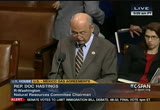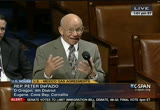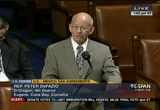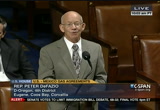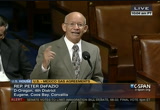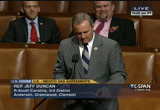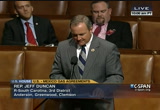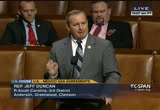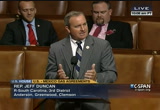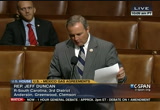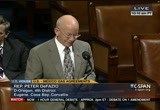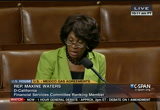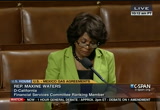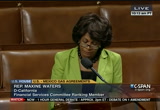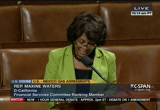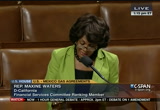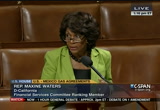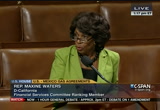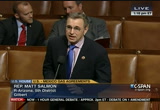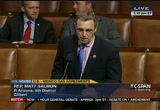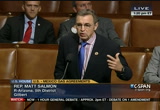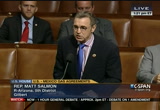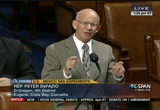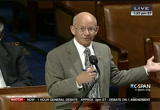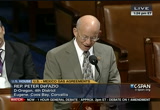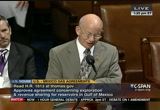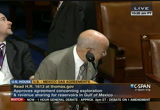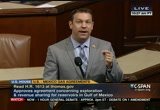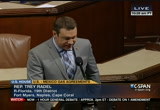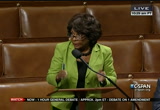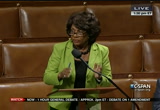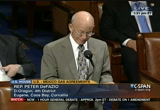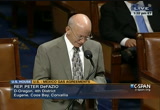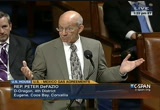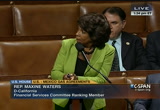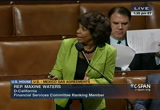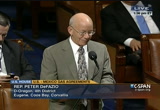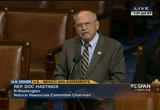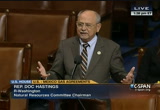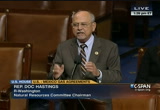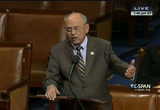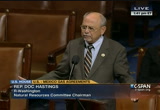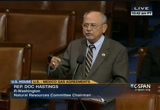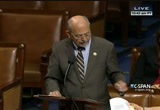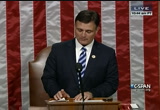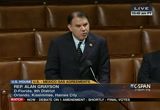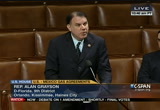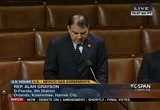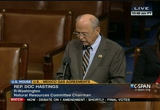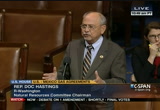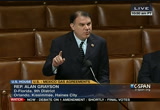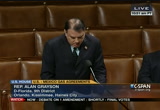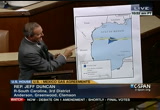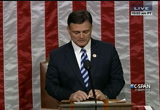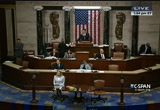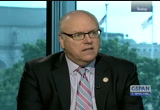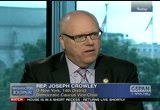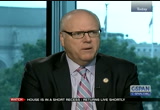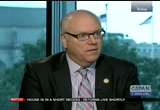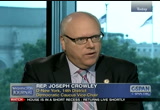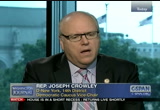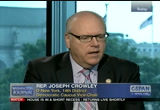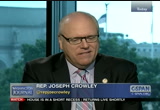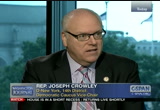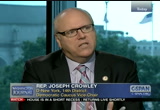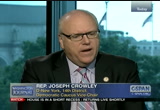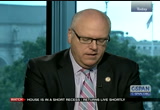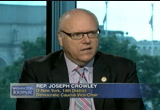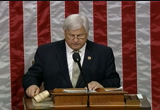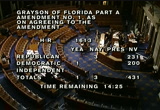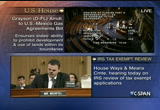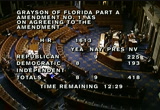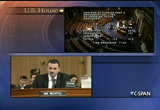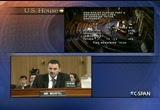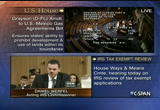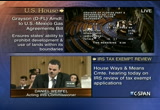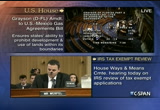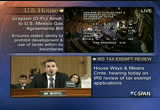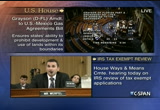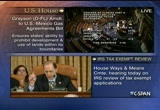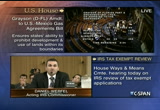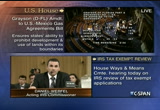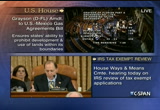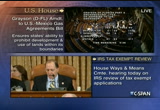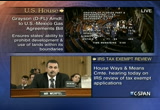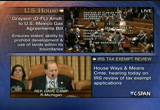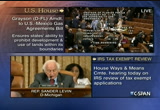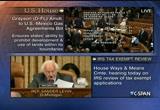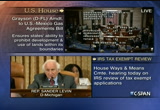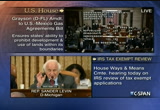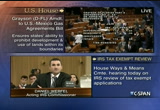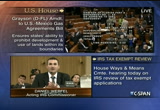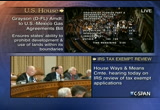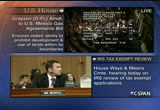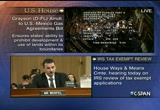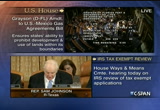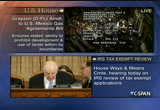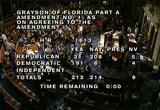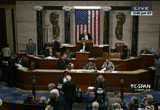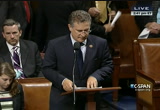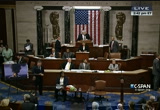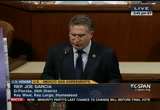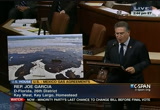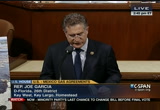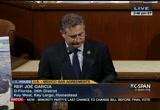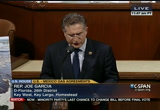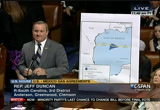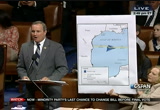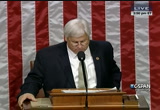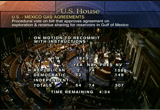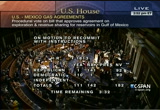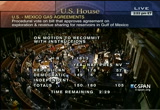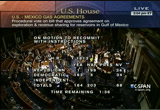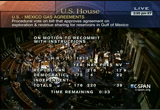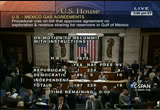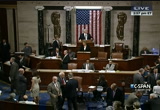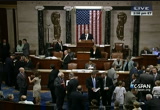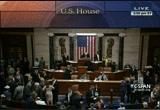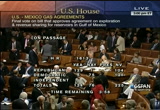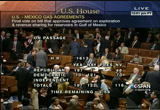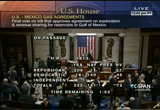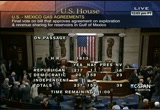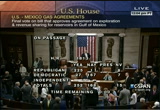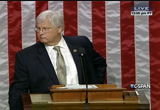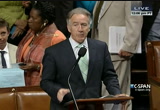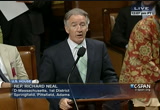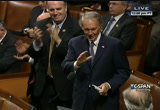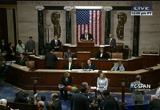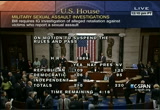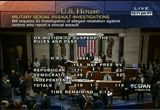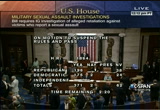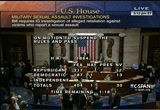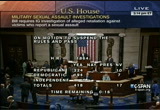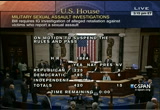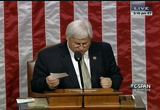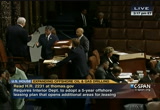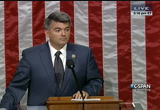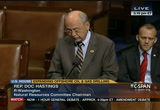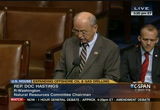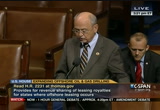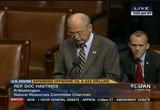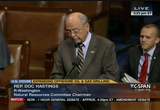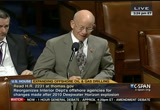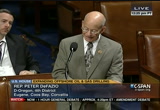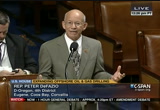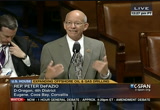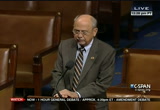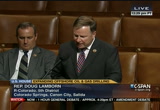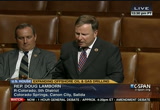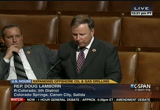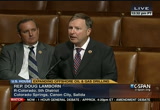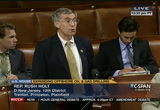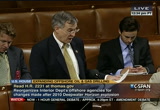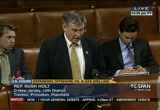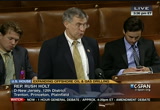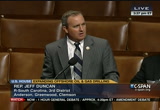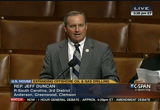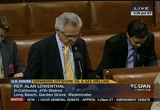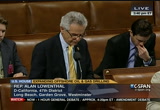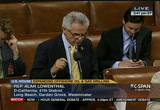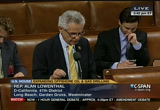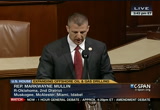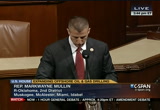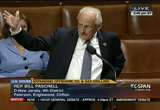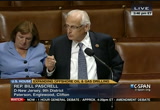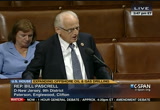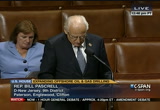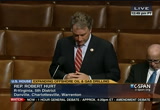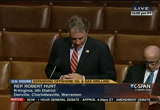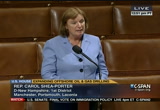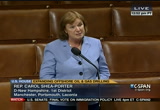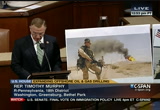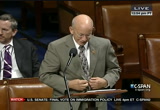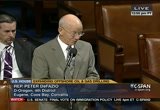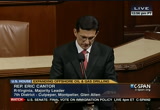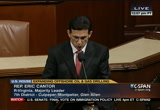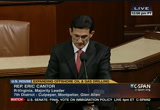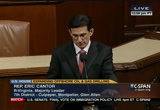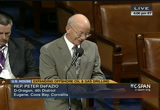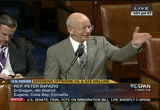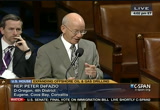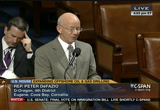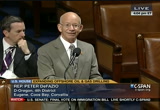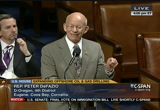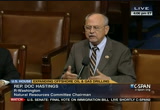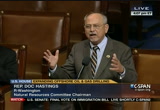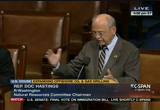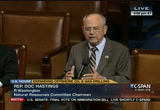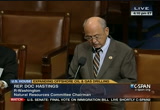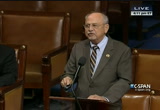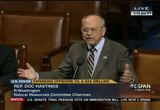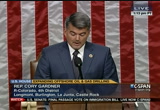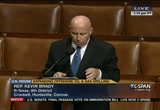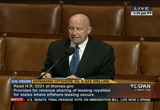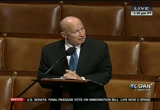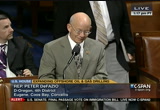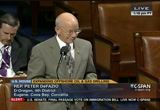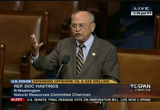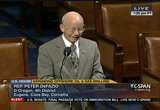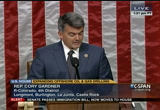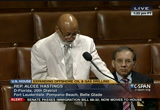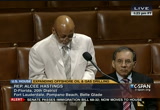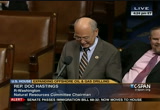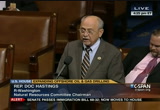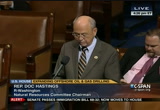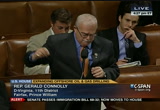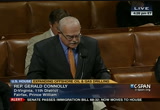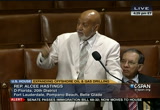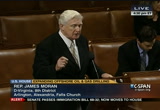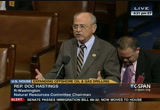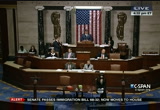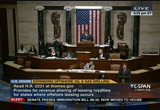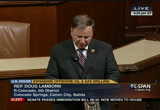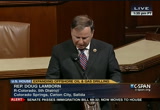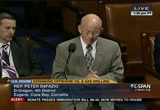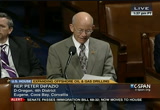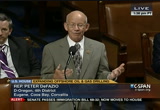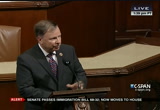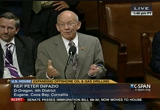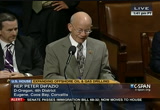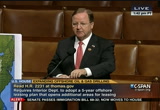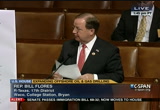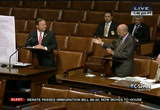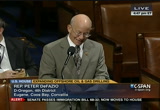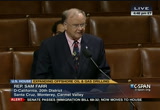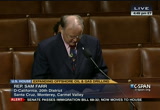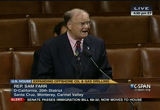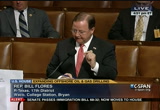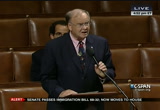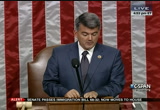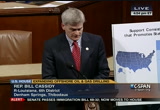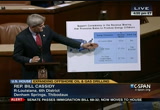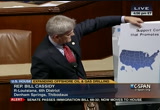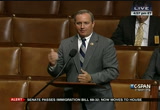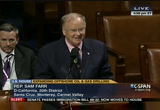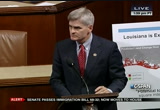tv Public Affairs CSPAN June 27, 2013 1:00pm-5:01pm EDT
1:00 pm
waiving the dodd-frank requirement is necessary in order to help protect american jobs and american made energy this this instance. without it, foreign control energy companies could develop this american energy resource and the royalty payments to mexico would still be undisclosed and kept private. but the net result would be americans would lose out on this energy potential. the natural resources committee and mr. duncan have worked hard to advance this bill and get it signed into law, it's important to american energy, to american jobs, and american energy security. and it is important to supporting trade with our neighbor to the south, mexico. i reserve the balance of my time. the speaker pro tempore: the gentleman reserves. the chair recognizes the gentleman from oregon. mr. defazio: mr. chairman, we could have done this bill as a
1:01 pm
suspension two days ago, that is, it probably could pass the house by unanimous consent which is very rare if this provision hadn't been added. there is consensus on both sides of the aisle that it's critical we move forward with this agreement to wecks -- with mexico to deal with shared resources in the western gulf of mexico. however, the republicans have chosen to use this as a vehicle to launch yet another attack on the wall street reform on the dodd-frank reforms. which is totally unnecessary. and obviously, it was presented as it's potentially possibly maybe a future problem for american oil companies if the mexicans chame their law, under their existing law there's no problem, we'll see disclosure, disclosure by mexican companies
1:02 pm
that ared bying, or american companies that are bidding, or any other foreign company bidding in the gulf, you'd see full disclosure. no one would be at a commercial or economic disadvantage. but the premise here is that someday mexico might change their law and therefore our companies would have to disclose and theirs wouldn't. some did happen at potential possible future date by some potential possible future mexican government, then the securities exchange commission has adequate authority even under the dodd-frank reforms to waive that requirement because of -- it would be in the public interest and commercial interest of the united states of america to waive that provision in this instance. now, that's dealing with mexico. the problem, the second problem with what they're proposing here is they actually want to
1:03 pm
repeal totally this section of dodd-frank for any future agreements with any other nations on a transboundary basis, which could certainly include canada, and likely with the conflicts that are looming over the arctic ocean and the resources up there, with russia. i get pretty nervous when i start thinking that u.s. companies are going to be negotiating secret agreements with russia and somehow these are going to protect our taxpayers, they're going to protect our shareholders, they're going to protect our public interests. that, i think, is really a very, very, very disturbing trend with this bill. so the issue is, do we want to get this done? we want to get it done, this is not the way to do it. because this bill as amended by the republicans to change the agreement and waive the rules for oil companies so they can make secret payments to the
1:04 pm
government of mexico, that will not pass the senate. bill l have yet another and further delay what the republican side wants to expedite which is offshore oil and gas development. so i would suggest that rather than expediting thing here's, we're messing them up and would suggest to my colleagues that we oppose this bill in this form, and bring it back as a clean authorization with the existing agreement, with mexico, and move forward and get it done and i expect if we got it done here, we could bring it up again and get it done in a day or under suspension or perhaps, i think, with unanimous consent even between today and form -- and tomorrow, and then the senate would pass it with unanimous consent and we'd be done with it. but instead we're going to have yet another example of the dysfunction of the congress here because we're going to pass a version here that cannot
1:05 pm
pass the -- pass the united states senate and then i guess republicans will try to blame the senate were not wanting to waive the rules and allow oil companies to make a secret payment to the government of mexico in order to garner commercial deals. with that, i reserve the balance of my time. the speaker pro tempore: the gentleman from oregon is recognized. washington, excuse me. mr. hastings: confused here, we do comb our hair the same way. i am pleased to yield five minutes to the author of this legislation, the gentleman from south carolina, the member of the natural resources committee and foreign affairs committee, mr. duncan. mr. duncan: i thank the chame of the natural resources committee for his leadership on his issue as well as my friend , mr. is a mop of arizona for his work on -- mr. salmon of arizona for his work on this issue.
1:06 pm
this will help create energy sector job, it will help meet our energy needs and help lessen our dependence on foreign sources of energy by producing those energy resources here at home and that's a national security issue, by being less dependent on foreign sources of oil, we'reless dependent on what goes on in that part of the world. there can be no national security without energy security and this is a step in the right direction. we're willing to say that the obama administration got something right. in forming this agreement, signing it in february of 2012, secretary clinton signed this agreement with the foreign minister from mexico, espinoza, to open up this area known as the western gap in the gulf of mexico so both countries, mexico and the united states, can explore and start producing oil and natural gas from this area. what it does is creates a broader legal certainty along that u.s.-mexico boundary area to foster more american energy development, job creation.
1:07 pm
the bureau of ocean energy management estimates that this area contains as much as 172 million barrels of oil and 34 billion cubic feet of natural gas. shared resources. but they're shared under a common border, a border teen the united states government and mexico -- a border between the united states government and mexico. but think about a border, think of it out in the gulf of mexico, it's a maritime boundy. these resources lie underneath the earth's outer continental shelf. so who do these resources belong to? this agreement says they are shared resources. and we ought to use the agreement to start harvesting. the gentleman talks about changes to dodd-frank, why is that necessary? who will benefit if we don't put that in there? i'll tell you who won't benefit, the american taxpayers
1:08 pm
because we won't be producing energy to meet their energy needs. without changes to this agreement, the language in the agreement can create an impossible situation for american companies operating on transboundary hydrocarbon resources. for example, mexican confidentiality requirements may forbid the disclosure of the very information that the dodd-frank rule requires of merican companies. this would lead to a situation where companies regulated by the s.e.c. have at the very least uncertainty about compliance with mexican and american laws this would place foreign state-owned oil company whors not regulated under dodd-frank and by the s.e.c. at a competitive advantage to the companies which operate under the united states' agreement and are regulated. so the change in this language will open up competition and allow the american companies to actually go to work without the uncertainty on which laws they need to comply with and which they don't. this is the right thing.
1:09 pm
the changes in the language will ensure that american energy development will go forward in the transboundary area. that those resources in that area will be harvested to provide the necessary energy for america. it drives our economy. this is the right thing for america. we're willing to enact this agreement because we want to harvest those resources and we want america to move toward american energy independence but ultimately we want to put americans to work, we want to create jobs. good-paying, long-term, energy sector jobs, and we do that by moving forward american energy independence. we do that by enacting this agreement and opening up one and a half million acres in the gulf of mexico for energy exploration and development. it's the right thing for america. it's a movement toward an all-american energy policy, utilizing american resources to meet american energy needs, putting americans to work. i can only see a win-win for
1:10 pm
democrats and republicans and all americans by moving this forward. we ask from february 2012 until now for the united states department of the interior to send us the enacting legislation. send us the enacting ability so that we can vote on something in the last congress and they failed to do that. understanding that we need to do that, the natural resources committee took the bull by the horns and said we're going to do it, we're going to pass the implementing language to enact that agreement and put americans to work and provide those resources that are so vital to moving this economy along. with that, mr. speaker -- mr. chairman, i yield back. the speaker pro tempore: the gentleman yields back. the chair recognizes the gentleman from oregon. mr. defazio: that was very impassioned and we can agree to the necessity of moving forward with the agreement. the problem is the gentleman ignored the fact that the united states senate will not pass this bill as written. they will not waive the
1:11 pm
dodd-frank disclosure rules to allow big oil companies to make secret deals with the government of mexico. they're not going to do that. so, you know, you're slowing things down by insisting on repealing part of these vital law reforms. with that, i yield as much time to the 1kwr5e89 from california, the ranking member of the financial services committee, who is an expert on this provision of law. the speaker pro tempore: the gentlelady is recognized. mr. defazio: such time as she may consume. ms. waters spst as rnking member of the financial services committee and a member of the committee that passed the dodd-frank legislation, i rise in opposition to h.r. 1613. i oppose the bill because of the exemption it includes for companies from the transparency requirements under section 1504 of the dodd-frank act. section 1504 of dodd-frank requires companies to disclose
1:12 pm
payments they make to governments for oil, gas, and mining resources. it covers companies listed on u.s. exchanges including u.s.-chinese -- including u.s., chinese, brazilian, australian and other companies. section 1504 as a -- has a long legislative history. the financial services committee held its first hearing on extractive energy transparency in 2007. in 2008, our committee held a legislative hearing where we debated the specific provisions that eventually became law. the senate introduced similar legislation and they held hearings. the provision was adopted and to the dodd-fronk -- into the dodd-frank act by a bipartisan amendment. then before issuing a rule to implement the law, the securities and exchange commission solicitted input,
1:13 pm
held meetings and considered hundreds of comments from industry, trade groups, member of congress, and civil society. section 1504 was very carefully onsidered by congress. over the course of several years. with input from all quarters. it is now the law of the land. and let me tell you why it's important. public disclosure of extractive industry payments can help diminish the political instability caused by opaque governance which is not only a threat to investment but also to our own national security. resource revenue transparency also allows shareholders to make better informed assessments of opportunity costs, threats to corporate reputation, and the long-term prospects of the -- prospects of the companies in which they invest.
1:14 pm
countries rich in natural resources are often developing countries that are politically unstable. many are rife with corruption, with a history of civil conflict fueled in part by natural resources. opening the extractive industries to greater public scrutiny is key to increasing civil society participation in these countries. this is crucial in order for citizens in resource-rich countries to be able to demand greater accountability from their governments for spending that serves the public interest. this in turn can help reduce poverty and create more stable democratic governments. it can also help create more stable business environments. the provision in h.r. 1613 that exempts companies from the disclosure requirements under section 1504 is entirely unnecessary. the bipartisan senate version
1:15 pm
of this bill includes no such exemption. also, the u.s.-mexico agreement explicitly respects the domestic laws of both countries, so it already accommodates the dodd-frank disclosure requirement. moreover, there are no laws in mexico that would prohibit the disclosure of company payments. let's also listen to what the administration has to say about this. after all, this administration negotiated the terms of the agreement with mexico. the administration very much wants legislation to implement the agreement and they know what they need to do this. and they don't want this bill. the white house issued a statement strongly in opposition to h.r. 1613 precisely because of the provision waiving the requirements for the public disclosure of extractive payments to government. the exemption in this bill is
1:16 pm
nothing more than an effort to undermine transparency and undo good public policy that's become an international standard. so i would urge my colleagues to oppose this bill in its current form. members deserve the opportunity to vote on a clean bill that they can support and i would urge leadership to give the house that opportunity. ladies and gentlemen, you have heard talk from both sides of the aisle about how important this bill could be. without this exemption. why would you undo the work of both sides of the aisle, the conference committee, the senate, and all, in working out this agreement, by putting this exemption? now i want you to know, those of us who work very, very hard to make sure we implement reform, those of us who are very much involved with dodd-frank, we not only
1:17 pm
understand all of the ways that people are trying to get around dodd-frank, to get under dodd-frank, to undo the reforms of dodd-frank, why does this exemption show up in this bill? it has no place in this bill. another attempt to get around dodd-frank and not to comply with the law and you're messing up a good agreement. it does not make good sense. i oppose this bill in this form, the administration opposes this bill in this form, and if you want the kind of agreement that you say you want with mexico, if you're interested in sharing those resources, you're interested in what you claim can be done, creating jobs, you would not move forward with this bill. you would not try to force this exemption on this agreement. i yield back the balance of my ime.
1:18 pm
the speaker pro tempore: the chair recognizes the gentleman from the gentleman from washington. mr. hastings: mr. speaker, i'm pleased to yield five minutes to the gentleman from arizona, mr. salmon, who worked very hard on this agreement, five minutes. mr. salmon: thank you very much, mr. chairman. i appreciate this opportunity to address congress today. i'm really pleased that as the chairman of the subcommittee on the western hemisphere for the foreign affairs committee that we held a hearing on this issue, and afterwards we cided after some extensive consultation with folks from the obama state department we worked with the chairman of the resources committee and the gentleman from south carolina, mr. duncan, to develop this language. you know, there's an old ax yum that says let no deed go unpunished.
1:19 pm
nowhere can be true than here in washington, d.c. this language reflects the agreement that the obama administration signed almost a couple of years ago, and so maybe there's some buyer's remorse and maybe the fact we don't agree to this language a couple years ago but the fact is this reflects the agreement that was signed. one other thing i'd like to mention is another great thing and the road to hell is paid with good intentions. unfortunately i didn't know that road went smack dab in the middle of washington, d.c. the fact of the matter is this is a good bill. people paying too much for energy costs, paying too much when you go to the pump and you fill up your car with gasoline and you go on vacation and you curse those gasoline pumps know full well we are trying to do everything we can on the republican side of the aisle to lower your gas prices. we're trying to do that by forming this agreement with
1:20 pm
mexico, a win-win. you've heard that term a lot today, because it is. it will create jobs both in mexico and the united states. pemex, the mexican oil company, does not have the deepwater drilling capabilities that our country does. so mexico reached out to us and asked us if we would agree to a treaty, to work together with them so we can joint drill. and isn't it about time that america looks to its neighbors, its friends, its allies in the region, like mexico, instead of having to rely on the thugs in the middle east for our oil? i think it's about time that america and the western hemisphere become energy independent, that we produce our own oil in this country and in this continent. and when we do so what's going to happen? we reduce the likelihood that we're going to have to get into a war because of some oil issue. we reduce the likelihood that some of these dess pet from other countries like venezuela
1:21 pm
or other countries in the middle east hold literally hold pundit, hold he the barrel and play their silly games. wouldn't you much rather rely on a country and a friend and a neighbor like mexico to be able to joint drill, develop that oil, lower gas prices, create jobs for americans and mexican citizens? this is truly a win-win. let's not let -- the perfect be the enemy of the good, the fact is this is the language that mexico had asked us to agree to and we're simply trying to move the ball ahead. we can do a lot of gamesmanship today and spout off about this or that but this is the agreement that was signed almost a couple of years ago. again, the administration drug their feet the last couple of years to get this to the floor.
1:22 pm
thankfully we have a chairman over here that took the bull by the horns and said we're going to do this. we're going to do this for the american people because it's a no-brainer. so it's basically time, i agree, for us to do this in a bipartisan fashion, get off our dead dare yares and get this -- dariers and get this job done. the speaker pro tempore: the gentleman from oregon. mr. defazio: i'd like to ask the gentleman a question, i'd assertion is your that mexico asked the government of the united states to include a waiver of our financial services reform provisions in section 105 in this agreement and the obama administration didn't agree to that but mexico signed the agreement anyway and now you're trying to help out the government of mexico to get something that you claim they wanted but didn't get from this administration, is that correct?
1:23 pm
mr. salmon: well, that's not correct. mr. defazio: that's what you said. mr. salmon: i appreciate you not putting words in my mouth. the language here is the language i believe embodies the spirit of the agreement between us and mexico. i believe it's exactly what the president's been asking for. mr. defazio: with that i would reclaim my time. so, ok, and i could ask to have the record read back but i won't because it will delay things but you said this is what mexico wanted. you did say that before. now you say you believe that this -- reflecting the spirit of the agreement. now, i will accept that. changing the agreement by waiving our financial services law is the agreement i don't believe that. maxine waters who serves on the financial services committee, and unfortunately the president of the united states doesn't agree with that so this bill is going nowhere. not going to get out of the
1:24 pm
senate. they have a bipartisan over there that doesn't waive dodd-frank that they can pass by unanimous consent. we could be done this with, but, no, we're not going to do that. we're going to play games. here's what the president said and he's got something to say about that in the end. he really does. the administration cannot support h.r. 1613 as reported by the house committee on natural resources because of the unnecessary extraneous provision that seriously detract from the bill. most significantly, the administration strongly objects to exempting actions taken by public companies in accordance with the transboundary hydrocarbon agreement from requirements under the section 1504 of the dodd-frank act and the securities and exchange commission's natural resource extraction disclosure rule. as a practical matter, this provision would waive the requirement for the disclosure of any payments made by resource extraction companies to the united states or foreign governments in accordance with
1:25 pm
transboundary hydrocarbon agreements and it negatively impacts u.s. efforts and increase accountability, particularly in the oil and gas and minerals sector. so if we proceed with this bill in this form the president will veto the form and we'll be back in how many months it will take i don't know. but to assert that somehow mexico wanted this or the administration wanted it and they kind of forgot to put it in the agreement and now we're helping them out even though the administration sayings they don't want it and i don't know what the government of mexico says, an then there was another issue raise -- and then there was another issue raised about confidentiality provisions. and in fact -- confidentiality agreements. and the s.e.c. has more than adequate capabilities to do general exemptions in sections 12-h and 36 of the securities exchange act. could issue exemptions from this disclosure requirement under this authority should it be warranted. in fact, the s.e.c. today confirmed with us that there is
1:26 pm
nothing that would prevent the s.e.c. from issuing exemptions should they be warranted. now, the objection here is to waiving any and all future agreements from any public disclosures of payments of foreign governments. it's not about this one agreement or problems that might crop up with agreements. it's about doing away with the critical section of dodd-frank. and if you want to do that, why not bring it up in the financial services committee, have a hearing, have a debate, send us a bill and repeal it, but don't try to do it in the dark of night to try -- in the hope if you attach it to this agreement which we all agree should be entered into. mexico wants, the u.s. wants. that you're doing anybody a favor. with that i reserve the balance of my time. the speaker pro tempore: the gentleman reserves. i recognize the gentleman from washington. mr. hastings: mr. speaker, i'm very pleased to yield two minutes to the gentleman from florida on this legislation.
1:27 pm
>> thank you, mr. chair. ultimately we hope that the senate can agree on this and the administration regardless of what we hear. we'd love to have some compromise although it is important to debate this here today. here's what i know that's important to you, how much you're paying at the pump every single time you go and fill up. what you're paying at the pump is eating into what you pay for groceries, your rent, your mortgage, but house republicans right here right now have a plan to put more money in your pocket and save on the important stuff like your gas and your grocery bill. mr. radel: we started by approving the keystone pipeline and what we're debating here today is an energy agreement with mexico and the agreement encourages the development of energy resources in both countries developed both in the u.s. and in mexico. you know, it strikes me. right now we have this talk about illegal immigration and how we're going to prevent it
1:28 pm
in the united states. the best way is to make sure we have a strong economy south of the border. not only do i know that as the vice chair on the subcommittee of the western hemisphere, but 've lived in mexico. [speaking spanish] mothers and fathers today are looking for opportunity for them, for their children, because at the end of the day this is about jobs, jobs, jobs. and it's about improving our national security. i mean, think about it. in terms of national security, do you really want to send your money to countries who really may not have our best intentions in mind, or do you want to partner with our energy allies to the north and south of us making us energy independent for generations to come working with our neighbors and our friends? now, mexico ratified this agreement over a year ago. they sent it to the president. now we're calling on the president to help us lower your price at the pump. this is as bipartisan as it
1:29 pm
gets. what we're trying to do here in washington is just help make everyday life a little bit easier for you. our goal is to save you money so you can spend less worrying about your budget and enjoying more time with your family. with that, mr. speaker, i yield. the speaker pro tempore: the gentleman's time has expired. the gentleman will provide a ranslation and members are reminded to address their remarks to the chair. i recognize the gentleman from oregon. mr. defazio: i'd yield to the gentlelady from california such time as she may consume. the speaker pro tempore: the gentlewoman is recognized. ms. waters: mr. speaker, i hear inside friends on the opposite side of the aisle keep talking about this as bipartisan as you can get. it was bipartisan before you snuck in the exemption that would allow companies to bribe governments and pay under the table and create cash in other countries. it was a bipartisan agreement. i keep hearing reference to this having the support of the
1:30 pm
administration. let me be clear, this bill in this form does not have the support of the administration. it did have before you sneaked in the exemption. dodd-frank made it very clear. it is the law. we worked very hard. both sides of the aisle in the conference committee worked on this part of the bill, and now we have you coming in the dark of the night one more time trying to undo dodd-frank and this is awful. it is really, really awful because we had the opportunity to have an agreement with mexico where we could both benefit from the drilling and we also supported that but, no, you decided to undermine the work of both sides of the aisle by putting this exemption in this bill and so it does not have the support of the administration. it is no longer bipartisan.
1:31 pm
we no longer support it, and you have the possibility of a eto on your hand. i yield back my time. the speaker pro tempore: the gentleman from washington. mr. hastings: i reserve. the speaker pro tempore: the gentleman from oregon. mr. defazio: how much time remains. mr. hastings: i'm prepared to close if the gentleman is ready to close. mr. defazio: mr. speaker, what we've heard here today is that by modifying this agreement, by preventing disclosure or payments by big oil companies to foreign governments, which could essentially constitute, you know, under-the-table agreements, bribes, however you have it, will somehow lower gas prices for the american people. now, i think if you went out and asked the american people,
1:32 pm
do you think allowing exxonmobil or any of the other big companies to enter into secret agreements with foreign governments to exploit jointly held resources is going to benefit you at the pump? i think they'd laugh at you. no offense, but they would. the bottom line is, this is also a further assertion that somehow this possible future development of this area will low they are price at the pump. it won't. it hasn't. today the prices are excessive. why are they excessive? there's a funny little thing that happens just around memorial day every year, the refiners and the refinery industry have been dramatically consolidated over the last few years because there's been buyouts and closures and everything else, they decide that they've got to do periodic maintenance, it's got to happen at the beginning of the driving season, and of course they all schedule it at the same time and limit refinery capacity and
1:33 pm
say there's a shortage and the price jumps up 50-cents a gallon like it did in oregon a month ago. 50-cents a gallon in a week, what happened in did you see anybody waving red flags saying we don't have gas? or yellow flags? do you remember the 1970's? no, ethey had gas. they just jacked up the price because that's the way the oil companies celebrate the beginning of the summer, by increasing profits with unwarranted increases in their price claiming there's a shortage because they're cleaning their refineries. they're exporting gasoline from the west coast. what does that mean? there's actually a glut of oil in the gulf region right now that they can't refine. we've got refineries closed in california with oil sitting in storage tanks. they can't be refined. somehow if we just had more oil to add to the glut, to add to
1:34 pm
the full storage tanks because the refineries are shut down to drive up the price or maybe they're not shut down, there's investigation -- there was an investigation last year, they clipped they were shut down but they weren't. so we don't know but to say, well, gee, we trust the oil companies, let's let them negotiate secret agreements with the government of mexico, with canada, with, you know, ultimately perhaps with russia, and that will benefit the consumers at the pump. it does not meet the laugh test. i would certainly yield. ms. waters: i would like to, if i can, engage you in a little colloquy here. for what reason would the members of congress try and protect the oil companies from simply sharing how much they're paying to governments? what reason would they have for doing that? mr. defazio: reclaiming my time, we heard earlier the
1:35 pm
assertion that that would protect american workers. i'm not quite certain how that is going to work out. and probably it doesn't even help stockholders because they might really want to know what's going on. i'm not sure. ms. waters: i want to make clear what this exemption is they're trying to do. it's a very simple request. it's in law. it says, just tell us. ma what you pay. -- just tell us what you pay. and we have now included in this bill where there is an agreement, an exemption that will not allow them or keep them from being able to share that information. as you said, they would now, if this passed, they would be able to make payments in secret. they would be able to make bribes. they would be able to maybe even be disruptive to countries that they are paying bribes to when they get into these
1:36 pm
conflicts in other countries. so why would they want to do this? i don't understand it. i thought maybe you might have some additional information that i don't have. but to mess up an agreement simply because you want to protect the oil companies from saying how much they're paying is beyond my comp rehence -- comprehension. i yield back. mr. defazio: i thank the gentlelady. if we pass the bill in this form, the president would veto it if they pass it in the senate, and they wouldn't pass it in the senate. they have a bill that would receive unanimous consent that does not contain this provision, that does not provide this waiver of the dodd-frank act in favor of the big oil companies. it's simple. i can see, i can count, in all probability, the republican side will prevail here but they are not furthering the cause of expediting the signing of this
1:37 pm
agreement and the execution of this agreement between mexico and the united states by sending a bill to the senate that the senate will not pass. with that, i would yield back the balance of my time. the speaker pro tempore: the gentleman yields back. i recognize the gentleman from washington. mr. hastings: how much time do i have remaining? the speaker pro tempore: 14 1/2 minutes. mr. hastings: i yield myself the balance of my time. the speaker pro tempore: the gentleman is recognized. mr. hastings: let me clarify a few points. the president didn't say he would veto it. he said we had a concern, i accept that. but the president did not say he would veto this legislation. after all, it was his secretary of state that negotiated an agreement. why would he veto an agreement negotiated by his secretary of state? secondly, if this could pass so easily out of the senate as my friend from oregon asserts, why hasn't the senate passed it? we always ask that question over here. in fact, sometimes we get
1:38 pm
ourselveses in a gridlock because we're so, maybe, frightened of what the senate may or may not do. listen if the senate wants to pass this agreement without this provision, do it. nobody is preventing them from doing it. nobody. now, let me make another observation here that i think is probably more important in this debate than anything else that has been said. that is, as was pointed out several times, i mentioned it in my opening remarks, mr. duncan mentioned it, mr. salmon mentioned it. in 2012 this agreement was signed. it was -- none of the information was given to us because we had to implement it. i wonder why? could it possibly be that the mindset of this administration which by the way has
1:39 pm
consistently been nonresponsive to more exploration on the outer continental shelf, offshore, if i may, mr. speaker, go back just a bit, when this administration took office, there was no moratoria on the pacific or atlantic coasts. one of the first actions of the -- of this president was to lock up 85% of those potential resources. maybe they do have a bit of a bias against offshore drilling. here's an amendment, an agreement signed over a year ago, took over a year for it to come here, because of no action on their part, it was going nowhere legislatively until mr. duncan said, listen, this is something we ought to do. so perhaps, mr. speaker, perhaps, it is the reason why they are taking this one element, and i'll talk about that in a miami, as a reason to oppose this legislation, really because they're trying to cover up the fact that they don't
1:40 pm
like any offshore drilling? i'll let somebody draw whatever conclusions they want. i simply ask a rhetorical question. now i will not, well, no, i'm -- i'd be more than happy to yield to my friend on that point. go ahead. i assume he wans to talk about that, i'm more than happy to engage in that debate. mr. defazio: thank you, mr. chairman, for yielding, i believe ms. waters stated clearly, there is substantial if not unanimous support on this side for this agreement without this provision which would lead to the development of these resources. mr. hastings: reclaiming my time. i think if you go back and look at the bills that have come in front of this body before in the last congress, in fact, later on today, you will find that the overwhelming opposition to those legislation, if it's going to mirror what happened in the last congress, was opposed to
1:41 pm
offshore development. i'll draw that conclusion, i'll make that observation, others can draw their conclusions. here is something that's very curious about this debate on why we should defeat this legislation because of this provision dealing in disclosure. anybody could have offered an amendment, you know, to take that provision out of the bill. would have been perfectly in order. nothing -- there's no parliamentary problem to strike from a bill. and there was an amendment, by the way, that was offered by a member from the other body, but was withdrawn. both my colleagues on the other side of the aisle arguing against this because of this provision, they could have offered the amendment. and it would have been made in order and we could have debated. but the amendment wasn't offered. now i don't know why. i'm not going to offer motivations, i'm just stating a fact. i'd be more than happy to yield. as you have st
1:42 pm
come to some conclusion that maybe we are opposing this bill because we're opposed to offshore drilling which is not drew -- which is not true -- mr. hastings: reclaiming my time, i simply said that there is a pattern in this administration, and my friends on the other side that oppose that. i'll let others draw that conclusion. i'll be glad to the gentlelady. ms. waters: thank you very much. i have drawn a conclusion when you raise the question about why didn't we offer an amendment and the senate can offer an amendment, why are you trying to get credit for putting this in the bill with the oil companies? mr. hastings: reclaiming my time. we believe that this provision in the dodd-frank is contrary to the agreement because the only moneys, and i'll get to this point, i was going to get to it later but i'll get to it now, because the only moneys that go to mexico is what the
1:43 pm
obama administration agreed to as royalties or leases. that is the only money that goes to mexico. we believe that there's no reason to have this particular requirement in the bill and that's why we did it. now you can disagree with that, of course. you have every right to do it. but if you believe that this bill should be defeated because of that provision, why didn't you offer an amendment. wait, there was an amendment offered and then withdrawn. curious. i don't know what the reasons are. all i can say, mr. speaker, is that this is a good piece of legislation. it deserves bipartisan support. and if the senate has a different view, let them pass their different view and we'll work it out. isn't that the reason our founding fathers had two bodies? work out the differences. for goodness sake -- with that, mr. speaker, i want to ask unanimous consent to insert in the record letters from the financial services committee and the committee on foreign affairs both of who had
1:44 pm
jurisdiction on this bill, i ask unanimous consent that their statements appear in the record. the speaker pro tempore: without objection, so order. mr. hastings: with that, mr. speaker, i yield back the balance of my time. the speaker pro tempore: the gentleman yields back. all time for debate on the bill has expired. for what purpose does the gentleman from florida seek recognition? >> mr. chairman, i have an amendment at the desk. the speaker pro tempore: the clerk will designate the amendment. the clerk: amendment number 1 printed in part a of house report 113-131 offered by mr. grayson soft florida as -- mr. grayson of florida as modified. the speaker pro tempore: pursuant to house resolution 274 and the order of the house today the gentleman from florida, mr. grayson, and a member opposed, each will control five minutes. mr. grayson: thank you very much. i want to thank the rules committee for ruling that this amendment is in order.
1:45 pm
i want to also thank the committee chair for giving me the opportunity to discuss this with him briefly before this matter came up before the house. this amendment should not be controversial. it reads as follows. nothing in this act and the amendments made by this act affects the right and power of each state to prohibit management leasing -- management, leasing, development, beneath navigable waters within such boundaries. this language may sound familiar to those who are familiar with the current division of authority between on the one hand the federal government and on the other hand the states. it's a reaffirmation of 43 u.s.c. 1311-a and 43 u.s.c. 1311 has a notable title, it's called the rights of the states. that is the guarantee and purpose of the amendment before us today, to make sure and to reaffirm the rights of the states.
1:46 pm
the concept is simple. if lands or resources falls within a state's boundaries, that state should have the right to manage that land and those resources in the manner that it sees fit. this is a principle that we in florida hold dear, and it's an important principle in every state and in fact an important principle to federalism itself. this principle has been enshrined in law since 1953 when the house passed h.r. 5134, to amend the submerged lands act. a majority of the democrats supported that bill as did an overwhelming majority of the republicans. the final vote within the republican caucus that year was 191 in favor and only 12 opposed. it's my hope that we'll see similar bipartisan support, in fact, overwhelming support today for this amendment to simplery reaffirm that principle. -- simply reaffirm that principle. as a member of the foreign
1:47 pm
affairs committee, i support transboundary agreements in general, and i hope that any dispute between the united states and anied a joining neighboring nation can be settled peacefully. this bill could be misconstrued without our amendment as potentially disturbing states' rights under the status quo. it calls for the expeditious development of the resources on age 3 and eliminating the, quote, stop work on any installation attached to the seabed of the united states including those erected for the purpose of resource exploration, development or production activities to inspection staff at the bureau of safety and environmental enforcement on page 6 of the bill. without our amendment, a future court that is unfamiliar with the subject might wrongly conclude that this statute has in fact curtailed states' prerogatives. i don't believe it was ever the intention of the natural resources committee to make such a dramatic change to the status quo, to the detriment of
1:48 pm
the statements and to states' rights. therefore, this amendment today should not be controversial. it's merely a reaffirmation of existing law, a section of the united states code entitled rights of states, and it's an effort to ensure that states can choose to do within its own boundaries and that what they choose to do is that which will happen. i reserve the balance of my time. the speaker pro tempore: the gentleman reserves. i recognize the gentleman from washington. mr. hastings: mr. speaker, i rise to claim time in opposition to the amendment. the speaker pro tempore: the gentleman is recognized for five minutes. mr. hastings: thank you, mr. speaker. mr. speaker, i find this amendment being offered on this bill to be rather strange because the amendment asserts itself as an effort to protect states' rights. well, the underlying bill is about an international agreement between the united states and mexico. and that boundary is about 200 miles from the nearest shoreline, and there's no
1:49 pm
jurisdiction of any state that goes that far out, particularly in the guffleguffle. so i -- particularly in the gulf of mexico. so i can assure the gentleman there's nothing in this bill that would change any existing laws as it relates to the states' rights and their waters. t this amendment isn't necessary. it is simply restating the status quo. the sponsor of the amendment and all those concerned with states' rights can be assured that the existing rights of the 50 states are fully respected and in no way undermined by this bill, as i just mentioned. however, adopting this amendment could impact international relations with foreign states, and the reason why, because in foreign law, as i understand it, the term state means foreign government. there's no -- there's no explanation in the amendment about states so that raises a concern. so by adopting this amendment,
1:50 pm
you could potentially destroy the agreement that we have in place. what will that do? well, it would delay american energy production and it would delay the creation of american jobs. so i urge a no vote on the amendment and i reserve my time. the speaker pro tempore: the gentleman reserves. i recognize the gentleman from florida. mr. grayson: thank you very much, mr. chairman. i appreciate the comments of the committee's chair but i must respectfully disagree with him on the merits. with respect to the gulf of mexico, it stretches 100 miles off the shores of florida. a matter that is of great importance in my state. furthermore, the fact is we cannot specifically restrain a future court from deciding contrary to the gentleman's opinion unless we do so in this bill. now, we've already had the experience this week that on tuesday a certain number of members of this body were disappointed by a supreme court decision, and on wednesday other members were disappointed by a supreme court decision. both of those decisions had to
1:51 pm
do with federalism. both of those decisions had to do with the construction of legislation. if we want to ascertain and commit to the fact that we're not changing current law, the only way to do that is to say that we are not changing current law. by not doing so we would be giving in effect the hostage to future courts for the end of time. it's in the nature of the supremacy clause that unless we say we are not taking away states' rights we might do so inadvertently, and that's exactly what this amendment would prevent. now, with regard to the second point, i don't know what foreign law may with regard to states but i do know what american law provides. in fact, not only in this title, not only in this chapter but in this subchapter there is a definition of state and that definition is as follows -- this is 43 u.s.c. 1301 under the heading definitions and that says, g, the term state means any state of the union. now, while i respect the
1:52 pm
gentleman's opinion, it's clear from a clear and plain reading from the statute that we're amending that in fact his position has no merit. therefore, i urge adoption of this amendment so we can protect states' rights and in particular the rights of coastal states. thank you. the speaker pro tempore: the gentleman's time has expired. i recognize the gentleman from washington. mr. hastings: i understand the gentleman's time has expired? the speaker pro tempore: yes. mr. hastings: i want to yield one minute to the sponsor of this legislation, the gentleman from south carolina, mr. duncan. the speaker pro tempore: the gentleman is recognized. mr. duncan: let's just be clear, america, what we're talking about and where we're talking about. this chart shows the western gap. the only area covered under the transboundary hydrocarbon agreement, the agreement negotiated by the obama administration to open up this area, 1.5 million acres in the gulf of mexico that's so far away from the shore of florida that really makes this amendment not applicable.
1:53 pm
this is the area we're talking about. this million and a half acres that would produce american jobs and american energy resources and with that i yield back. mr. hastings: mr. speaker, just simply to close -- i yield myself such time as i may consume. the speaker pro tempore: the gentleman is recognized. mr. hastings: just simply to close, this amendment is unnecessary and i think that chart points it out. you are talking about hundreds of miles offshore and this amendment asserts to protect states' rights. i'm sorry, mr. speaker. i cannot connect the dots on that, and i urge defeat of the amendment. i yield back the balance of my time. the speaker pro tempore: the gentleman yields back. pursuant to the rule, the previous question is ordered on the bill, as amended and on the amendment offered by the gentleman from florida, mr. grayson, as modified. the question is on the amendment by the gentleman from orida, mr. grayson, as modified. those in favor say aye. those opposed, no.
1:54 pm
in the opinion of the chair -- mr. grayson: mr. chairman, i request a recorded vote. the speaker pro tempore: pursuant to clause 1-c of rule 19, further consideration of h.r. 1613 is postponed. pursuant to clause 12-a of rule 1, the house will stand in recess subject to the call of the chair. for the period of less than 15 minutes. mr. grayson: mr. chair, just to be clear, i am going to request a recorded vote. "washington journal" continues.
1:55 pm
as isjoining representative joe crowley, democrat from new york. he represents the queens in the bronx areas of new york city. vice chair of the democratic caucus in the house. issue,tart with a local the mayor's race in new york. have you endorsed, and why is it so tight? guest: i have endorsed chris quinn, speaker of the city council. why is it so tight? i think it is early and people
1:56 pm
are still measuring up the folks that are running. it is a crowded field. there are five candidates in the .emocratic primary it self that lends itself to a lot of information, a lot of people. it is early. i think people will get back to vacations -- from vacations and will focus on the race. it is a classic new york race, similar to what happened in 1977. i remember as a young man, a little boy, that race in which were inomo and ed koch the race. what do you think about your colleague anthony weiner jumping in? guest: he is a politician, very smart. i do think it was premature in terms of his reentering into
1:57 pm
the political arena, the public arena. , people arepective looking for a little bit more remorse. having said that, that is done now. he is in the race, performing well. is that it is still a little raw for many new yorkers, and at the debt will play out. not so much about anthony -- i am supporting chris quinn because i think she is the right candidate. it will be historic, the first woman, the first openly gay mayor of new york city. she is tough. if it was a man that was tough, they would say he is right for the job. it is a woman, she gets a little bit of a double standard. you have to be tough to be mayor in new york. i think she has all those assets. i think she has done a lot of great things already for the city.
1:58 pm
the mayor at this point. but as this campaign continues to rollout, i think she will get the credit that is due to her. things going the on up on the hill -- the nsa issues, the leaks, the irs issue. have these been damaging to the democratic brand? , everyi think, you know issue now that is raised -- i jokingly said a few weeks ago, what did the president know and when did he know it? it has gotten to the point that everything now is a scandal, and it is very scripted. we hear the same keywords over and over again. the scandal-ridden white house. blah, blah, blah. i think most people see through it. we saw chairman issa and his original statements about how , he wasissue, you know
1:59 pm
convinced that it came from the top-down, that he white house knew everything. now it turns out that it was a faulty investigation, that there were progressive groups or alsoy groups that were targeted by this outfit in cincinnati. it has thrown a wrench into their overall argument and there are investigations. i wonder how they handle it now. that is the question going forward. we will have the hearing today in the ways and means committee. how our republican colleagues handle this in light of the new information -- i think somewhere waiting for the shoe to drop and wanted to see a direct link to washington. instead, it is the opposite. this is much broader persecution. i do not think anybody should be sought after the irs because of their political beliefs.
2:00 pm
the irs needs to carry out the law as it is interpreted by the courts. ,o individual, no organization because of their political belief whether it be left, right, middle, whatever, should be targeted by the irs. host: c-span will be covering that ways and means hearings on the irs. it will be live on c-span.org. keith alexander recently met with the house democrats. is that true? why just the house democrats, and what did you hear? guest: i was not at that particular meeting. to thathave the answer as to why it was just democrats. -- i think they have information they want to divulge. it happens with republicans as well. edward snowden a hero
2:01 pm
or a skunk or something in between? guest: some people were asking questions about why proper channels were not used to disclose possibly some oversteps by the government, and i think many of us were kind of listening to what was actually being released. as time has gone on in people realize that maybe the intention here, and snowden himself is made reference to the fact that he got involved in the nsa to do the things he is doing today, and i think that creates some questions about his character and what his motivations were. of his motivations were to be subversive and to undermine the united states, i think that changes the ballgame. looking at the countries he is associating himself with of late, china, russia, venezuela, starts to create,
2:02 pm
in the minds of many americans, some questions about his motivation. i think that what he did is wrong. i think he -- if he is putting -- i think he has put in jeopardy the interest of the united states and the national security. that is wrong. some suggested suggested would be treasonous. necessarilywant to take that step. but we need to ask questions. we need to ask about the materials and who has access to that. host: what is your role as vice chair of the caucus? guest: i am elected as vice chairman of the caucus. it is one of the five elected positions within the house leadership. in the minority, it is the minority leader, the minority whip thomas special assistant to the leader. nancy pelosi, steny hoyer.
2:03 pm
of the democratic caucus and myself as the vice chair. we have meetings, sometimes two or three meetings, from a caucus perspective. it gives all the colleagues in the democratic caucus an opportunity to ask questions to leadership, and we hear from opinion makers. having theis about opportunity to hear from each other and people to express themselves to the leadership of the house. host: do you ever meet with the republican leadership as a group? that: i have not had experience yet. i think for the most part that is done. i do think that leader pelosi does meet with speaker boehner. they talk white -- quite often. steny hoyer has talked with the majority leader and majority whip.
2:04 pm
i have had conversations with our counterparts in terms of the republican caucus leadership. ,ut actually getting together it has not happened in my experience. i cannot speak to past leadership meetings, on the past --only the past six or seven months. host: you have been in congress about 15 years or so. what changes have you witnessed, if any? , we have aknow tendency to talk about the immediate, what is happening right now. i think that most people who know me know me to be very optimistic. they often talk about how we're going through a phase. we will will get through this phase. we will move on, the country will be ok. i often think about people who think that they are indispensable, that somehow the country cannot go on without them. colleagues at april
2:05 pm
16, 1865 after abraham lincoln was killed, the country did not go on. we went through turmoil and good times as well, but country has survived. we will again. i have not seen it as polarizing and my 15 years as i have had for these past few years come a particularly this year. on top of that, within the majority party -- there was last week's vote on the farm bill which of the sizes where this is coming from. i do not believe it is coming the democratic caucus in the house. we are in the minority. we do not control what bills come to the floor. the agenda that is passed as the majority's agenda for the most part. many of the major bills that have passed have passed with the majority votes. i think speaker boehner finds
2:06 pm
himself in a difficult and awkward position. i respect him but do not agree with him on everything, just about anything at this point. but i do respect him. i feel for him to some degree as well, because what is happening and that caucus i do not pretend to know but it is anything but unified. that presents problems when trying to pass legislation. even the farm bill. in new york, it is not the first thing we think about when we wake up in the morning. it should be. it should be called the food bill. that would have more residents -- resonance. the failure to act on something that was so taken for granted that this happens, i think it sends a shocking wave throughout washington and beyond that things really are not normal in any sense of the word. host: how did you vote on the original patriot act and what
2:07 pm
about reauthorization? guest: i voted in favor of the original patriot act in light of 9/11, my home town having been attacked. it was not just an attack against my hometown of new york city, it was an attack against our country. whatever breakdown in intelligence had taken place, whatever new tools our enemies were using, i think we needed to re-examine and do whatever we could for 14 additional attacks thwarting an additional attacks. as time has gone on, concerns about civil liberties have been raised. i have questioned whether or not we need to continue to have the same orders in effect and since then have been consistently, at this point, wanting to normalize our intelligence-gathering to some
2:08 pm
degree. i think we have the tools in place now that have protected said little less, and -- have protected us a little less, and there have been changes in the patriot act and the fisa laws. we are moving towards more balance. you will never have everyone completely satisfied. that is always a challenge of congress. we will continue to do that as long as it we are here, and i think we will be here for a long time. host: representative joe crowley, democrat from new york. now it is your time to call in. we have put some issues on the table. a lot we have not talked about yet. we will begin with a democratic all, kathleen in chicago. caller: how are you doing? ok, you know, i am a diehard democrat. so it hurts me so bad that the democrats, you all would not stand up to these republicans.
2:09 pm
you are there to help the american people. you just let these republicans get away with murder. they come up with scandals and lies, and you all just stand down. i do not understand. my main thing for calling you, when are you all going to get busy with his voting rights act? because if you do not get busy now and let these republicans get away with this, our party will be dead on arrival. this is why they are voting where we cannot even go to the polls. this is serious. all this other stuff, this mess about everything but what we're supposed to do. you all get busy with his voting act because we are in a world of trouble. host: all rig rule 19, further consideration of h.r. 1613 will now resume. the clerk will report the title. the clerk: union calendar number 70, h.r. 1613, a bill to amend the outer continental shelf lands act to provide for
2:10 pm
the proper federal management and oversight of transboundary hydrocarbon reservoirs and for other purposes. the speaker pro tempore: when the house recessed, the chair had declared that the noes prevailed on the grayson amendment as modified. for what purpose does the gentleman from florida seek recognition? >> i mr. grayson: i request the yeas and nays on that amendment. the speaker pro tempore: the yeas and nays are requested. those favoring a vote by the yeas and nays will rise. a sufficient number having arisen, the yeas and nays are ordered. members will record their votes by electronic device. pursuant to clause 8 and clause 9 of rule 20, this 15-minute vote on the adoption of the amendment will be followed by five-minute votes on adoption of a motion to recommit, h.r. 1613, if ordered, passage of h.r. 1613, if ordered, and the motion to suspend the rules on h.r. 1864.
2:11 pm
this is a 15-minute vote. [captioning made possible by the national captioning institute, inc., in cooperation with the united states house of representatives. any use of the closed-captioned coverage of the house proceedings for political or commercial purposes is expressly prohibited by the u.s. house of representatives.]
2:40 pm
2:41 pm
continental shelf lands ack of hydrocarbon reservoirs and for other purposes. the speaker pro tempore: the ouse will be in order. the house will be in order. for what purpose does does the gentleman from florida rise? >> mr. speaker, i have a motion to recommit at the desk. the speaker pro tempore: the gentleman will suspend. the chair will receive a message. the speaker pro tempore: the president of the united states -- the messenger: the president of the united states. the messenger: i am president-elected die the president of the united states to deliver to the house of representatives a message in writing. the speaker pro tempore: for what purpose does the gentleman from florida seek recognition? >> i have a motion to recommit at the desk. the speaker pro tempore: is the gentleman opposed to the bill? >> in the current form. the speaker pro tempore: the gentleman qualifies. the clerk will report the
2:42 pm
motion. the clerk: mr. march see ya of florida moves recommit the bill with instructions to report the same back to the house forthdid with the following member. add at the end the following, title, miscellaneous provisions, section, avoiding another b.p. disaster, a, safety requirements. and implementing a transboundary agreement implemented or approved under this act, the secretary of the interior shall require that drilling operations conducted pursuant to such an agreement meet requirements for, one, third party certification of safety systems related to well control such as flow out preventers. two, performance of flow out preventers, including quan at this at thisive risk assessment standards. the speaker pro tempore: the ouse will come to order. for what purpose does the gentleman from south carolina
2:43 pm
rise? >> i ask unanimous consent to dispense with the reading. the speaker pro tempore: is there objection? without objection, so moved. the gentleman from florida is recognized for five minutes. mr. garcia: thank you, mr. speaker. >> mr. speaker, the house is not in order. the speaker pro tempore: the gentleman is correct. the house is not in order. the house is in order. the gentleman from florida. mr. grar see ya: mr. speaker, this is a final amendment to the bill. this will not delay or kill or send it back to committee. if adopted the bill will proceed immediately to final passage as amended. just over three years ago the deep water horizon drilling rig exploded, killing 11 workers and spilling 200 million gallons of oil into the gulf of mexico.
2:44 pm
our nation was gripped with images like this and this, of oil gushing into the gulf, washing up on to our shores -- the speaker pro tempore: the gentleman will suspend. the house will be in order. the gentleman deserves to be heard. please take your conversations offer the floor. -- off the floor. the gentleman from florida will proceed. mr. garcia: mr. speaker, this was the worst environmental disaster in our nation's history. with economic costs of over $40 billion, while other gulf states suffered more, florida's tourism and fishing were hurt. mr. speaker, it could even be worse. more damaging next time. that's why my amendment that i'm offering today is so important. the amendment will prevent another b.p. oil spill by imposing safety standards for drilling based on what we learned from this terrible accident.
2:45 pm
if such a disaster is to occur again, this amendment will also make sure that the polluter pays for the clean up. and the b.p. oil accident shows, something happening hundreds of miles away affected florida's coasts and can easily bring oil to our state's shores. in south florida we know that these spills are not just a threat to the environment, they are a threat to our economy. . the speaker pro tempore: the gentleman is right. the house is not in order. the gentleman deserves the right to be heard. the gentleman is recognized. mr. garcia: it would hurt local fishermen, restaurant owners, small businesses and families that depend on these businesses for their jobs and livelihoods. with approximately 90 million
2:46 pm
visitors per year, florida is one of the top destinations of the world. our tourism industry generates nearly $70 billion annually. supporting over one million jobs throughout the state, people from all over the country, in fact, all over the world, travel to florida to enjoy our incredible beaches, our unparalleled sports fishing and our state's natural and unique treasures. anglers come to my district, the sports fishing capital of the world, to enjoy sports fishing that cannot be matched anywhere else in the world. my district also includes the lorida evergleads -- everglades, a jewel in our national park system. in south florida, we know our economic future preserves our environment. that's why we're protecting florida's coasts from the
2:47 pm
danger of offshore drilling. has always drummed the support from both sides. this is not a democratic issue, this is not a republican issue. it's a florida issue and in fact it's a national issue. at a time when we face so many important issues, we here in congress need to work together to do what's right. while i'm new to the ways of washington, i hope we can put party pressures aside and put america's people first. to vote colleagues yes. the speaker pro tempore: the gentlelady is correct. the house is not in order. the house will come to order. members, please take your conversations off the house floor. mr. garcia: i hope and believe we can put party pressures aside. i urge my colleagues to vote yes to ensure that we can protect our environment, our economy, our nation from another disaster like the b.p.
2:48 pm
oil spill. i yield back the balance of my time. thank you, mr. speaker. the speaker pro tempore: the gentleman yields back the balance of his time. who seeks recognition? for what purpose does the gentleman from south carolina rise? mr. duncan: mr. speaker, the house is not in order. the gentleman from south carolina is recognized. mr. duncan: i claim the time in pposition to the motion. the speaker pro tempore: the gentleman is recognized. mr. duncan: thank you. i urge opposition to this motion, mr. speaker. what we have here in this motion to recommit is just the latest attempt by few on the other side of the aisle to cater to special interests needs of the american people. behind me i have a copy of the transboundary area that we're talking about, the western gap. if you'll notice in that map, u won't see the state of florida. this bill enacted an agreement between the united states and mexico to open a million and a half acres in offshore drilling
2:49 pm
in the gulf of mexico, an agreement negotiated by and signed by the secretary of state, hillary clinton, in february of 2012. we want to make sure this agreement will help create american jobs. we want to make sure that we're developing our resources in a safe and responsible way. we want to make sure that this bill puts us on the path toward north american energy independence. this bill does all of those things, yet, the gentleman offers the motion, says he's against the bill. actually, he says he's for it for a lot of different reasons. there's an attempt to delay, the fact that we need to make changes. the time for delay is over. the time to come together in a bipartisan way to create jobs through energy is at hand. we want to develop these resources to achieve north american energy independence and end our dependence on middle eastern sources of energy, and we want to reduce the cost of fuel for all americans. we want this bill to be part of an all-of-the-above, all-of the
2:50 pm
american, all-american energy strategy. we want to provide the regulatory clarity that's necessary, the certainty that energy producers need to explore in this area, create the jobs and produce the energy that we need. and for all of you still on the fence about whether or not to support this bill, let us remember that this is the administration's agreement, and we actually want to get it enacted. so let's get to work creating american jobs while producing america's energy and let's defeat this motion and pass this bill putting americans back to work and with that i yield back the balance of my time. i urge opposition. the speaker pro tempore: the gentleman yields back. without objection, the previous question is ordered on the motion to recommit. the question son the motion. all those in favor say aye. those opposed, no. the noes have it. the motion is not agreed to. mr. garcia: mr. speaker, i ask for a recorded vote. the speaker pro tempore: a vote is requested. those favoring a recorded vote
2:51 pm
2:59 pm
the speaker pro tempore: question is on passage of the bill. the ayes have it. > i ask for a recorded vote. mr. defaws yoke: i request a recorded vote. the speaker pro tempore: those favoring a recorded vote will rise. a sufficient number having risen a recorded vote is ordered. members will record their votes by electronic device. this is a five-minute vote. [captioning made possible by the national captioning institute, inc., in cooperation with the united states house of representatives. any use of the closed-captioned coverage of the house proceedings for political or commercial purposes is expressly prohibited by the u.s. house of representatives.]
3:05 pm
3:06 pm
he house will come to order. the hougs will come to order -- he house will come to order. he house will come to order. for what purpose does the gentleman rise? >> mr. speaker, i ask unanimous consent to address the house for one minute and speak out of order. the speaker pro tempore: without objection, the gentleman is recognized. >> mr. speaker, on tuesday, june 25, our colleague ed markey was elected to the nited states senate.
3:07 pm
neal: from - in to the kennedy family, we have sent great people to the united states senate. john kennedy served in this house and thought it was a privilege before he went to the united states senate. i would also just say a couple of personal things about our colleague. no one ever walked away from ed markey and said he didn't know what he was talking about or he was uninformed. he engages the debate fully and
3:08 pm
having known him for more than three decades, he's fulfilling a personal ambition. in addition to which, he has promised me that he will take the humility of this institution and bring it to the nited states senate. the last point that i think is very important and a reminder to all of us, in the polling data that led up to ed's victory, by 15 point the people said they thought it was his experience that would serve him well and that was a deciding factor in why they sent him to the united states senate. a round of applause for our friend, ed markey.
3:09 pm
the speaker pro tempore: the gentleman yields back. without objection, five-minute voting will continue. the unfinished business is a vote on the motion of the entlewoman from indiana, ms. walorski, suspend the rules and pass h.r. 1864 on which the yeas and nays are ordered. the clerk will report the title of the bill. the clerk: h.r. 1864, a bill to amend title 10, united states code, to require an inspector general investigation of retaliatory actions taken in response to reporting sexual assault. the speaker pro tempore: the question is, will the house suspend the rules and pass the bill. members will record their votes by electronic device. this will be a five-minute vote. [captioning made possible by the national captioning institute, inc., in cooperation with the united states house of representatives. any use of the closed-captioned coverage of the house
3:10 pm
3:17 pm
motion is laid on the table. mr. hastings: i ask unanimous consent that all members have fave legislative days to revise and extend their remarks. the speaker pro tempore: is there any objection? without objection, so ordered. pursuant to house resolution 274 and rule 18, the chair declares in the committee of the whole house on the state of the union for consideration of h.r. 2231. the chair appoints the gentleman from colorado, mr. gardner, to preside over the committee of the whole. the chair: pursuant to the rule, the bill is considered as read.
3:18 pm
the house is in the committee of the whole house on the state of the union for the consideration of h.r. 2231 which the clerk will report by title. the clerk: a bill to amend the outer continental shelf lands act to increase energy exploration and production on the outer continental shelf, provide for equitable revenue sharing for all coastal states, implement the reorganization of the former minerals management service and to distinct and separate agencies and for other purposes. the chair: pursuant to the rule, the bill is considered as read the first time. the gentleman from washington, mr. hastings, and the gentleman from oregon, mr. defazio, each will control 30 minutes. the chair recognizes the gentleman from washington. mr. hastings: mr. chairman, the committee is not in order. the chair: the committee will be in order. the committee will be in order.
3:19 pm
members will take their conversations off the house floor. the gentleman deserves to be heard. the committee will be in order. the gentleman from washington is recognized. mr. hastings: thank you, mr. chairman. i yield myself such time as i may consume. the chair: the gentleman is recognized. mr. hastings: mr. chairman, i rise today in strong support of h.r. 2231, the offshore energy and jobs act. unlike the president's plan that we heard from this week, which is to impose new energy taxes and federal red tape that will increase energy prices and cost american jobs, this republican plan will expand access to our own u.s. energy resources in order to lower energy prices and increase american jobs. gas prices have nearly doubled since president obama took office. the national average today remains above $3.50 per gallon compared to the $1.89 it was when he took office.
3:20 pm
we shouldn't have to accept potentially $4 a gallon gas prices, especially when we have the resources right here at home. higher gas prices mean we are -- mean we are making tough budget choices. for small businesses, it may mean the difference between hiring more workers or having to let some go. for families, it may be the difference between replacing wornout household appliances or making due with makeshift repairs. this is why access to affordable energy is so vital. for decades, most of our nation's offshore areas were under a moratorium, preventing any offshore development. all of that, mr. chairman, changed in the summer of 2008 when outrage ousley high gas prices made our nation's energy struggles a regular topic of conversation around the dinner table for american families. ater that year, congress and
3:21 pm
then-president bush lifted those moratoria with the hopes of fostering an era of increased energy production. president obama then came into office and he came into office with a tremendous opportunity. for the first time in more than a generation, he had the ility to open new offshore areas to oil and natural gas production. sadly, instead he went out of his way to shut down this opportunity by putting forth a new five-year offshore leasing plan that locks up 85% of our offshore areas. the plan includes no new results in no new american jobs. in fact, it includes the lowest number of lease sales ever offered in an offshore lease plan. mr. chairman, that's the worst record than president jimmy carter. we must do better. that's why we are here today to consider an offshore energy and jobs act. this legislation puts us back
3:22 pm
on the right path. one that will open new areas to deprilling, one that will create $-- drilling, one that will create 1.2 million american jobs, one that will lower energy prices and one that will generate $1.5 billion in new revenue to the federal government. but it's not only energy jobs that will be created. it's associated industries like manufacturing, boating, transportation and service industries like hotels and restaurants. they, too, will also benefit. this legislation requires the administration to implement a new five-year leasing plan that includes areas with the most oil and natural gas such as the mid-atlantic and alaska and off southern california. it's not a drill everywhere plan but rather a drill smart plan that focuses on those areas where the greatest potential lies. it would also require specific lease sales to be held off the south carolina and
3:23 pm
virginia. the latter of which was originally scheduled to take place in 2011 but was canceled by the obama administration. there is bipartisan support in the virginia delegation in favor of virginia lease sales, but, again, this the administration canceled it and would not have any future sales until 2017. the bill establishes a fair and equitable revenue-sharing program with all coastal states that have drilling off their coasts, much like the gulf states now currently enjoy. revenue sharing will create new incentives for opening offshore areas for drilling. again, more energy -- american energy production equates to more jobs and a stronger economy. and finally, mr. chairman, the bill includes reforms to further enhance the accountability, efficiency, the safety and ethical standards of offshore energy operations. these reforms will allow for the robust production of our
3:24 pm
nation's offshore energy resources while ensuring that all activity is conducted with proper oversight. offshore energy production has steadily declined under this administration. and frankly, mr. chairman, it is time to reverse that trend. h.r. 2231 will remove government barriers that are currently blocking access to our american energy resources. it will safely and responsibly unlock our energy and allow us to create over a million new american jobs. i urge my colleagues to support the offshore energy jobs act and with that i reserve the balance of my time. the chair: the gentleman reserves. the gentleman from oregon is recognized. mr. defazio: well, here we are again. it's the -- kind of a groundhog day moment for congress. this bill or individual parts of this bill passed the last congress five times, never went anywhere in the senate and will meet the same fate again.
3:25 pm
now, the premise here is that if we had mandatory offshore oil leasing in the more sensitive areas of the coast -- remember, 75% of the known recoverable resources are available currently under lease. now, currently there are 4,484 leases on the outer continental shelf that aren't producing. those leases cover 30 million cres, 85% of the total acreage currently under lease. we estimate there's 18 billion barrels of oil under hees leases and -- these leases 50 trillion cubic feet of natural gas. when i asked one why they needed to put more acreage under lease when they're sitting on all this, his answer was, these things take a long time. they take a long time, let's encourage them to develop what they've already leased to go
3:26 pm
after these -- you know, these 18 billion barrels of oil and 50 trillion cubic feet of natural gas and then when they're making progress there then they might come back and petition for more and we'll make a decision at that point given the needs of the country. but the premise that somehow by putting more leases out there with no requirement for them to perform that the price of gas will drop. that's absolutely untrue. we all know that's untrue. the american consumers know it's untrue. the principal reason that underlays the 50 cent a gallon runup in may which we're still paying is refineries. our refineries need to be cleaned and maintained and periodic maintenance and couple of them have broken down. we have seen incredible consolidation in the refinery industry and it's always the reason of jacking up the price or memorial day and fourth of july weekend. they claim the refineries are shut down. an investigative reporter got in there and they were
3:27 pm
operating and they were exporting gasoline from the united states overseas and claiming there was a shortage here. now, we're in a world market. not much we can do about that. so the world price is what we pay for oil and gas. and it's a manipulated market. it's a collusive market. we really want to do something, members on the other side would join me in getting the administration to file a complaint against opec for manipulating the market and violating the world trade organization. you would join in investigating these sprishes -- suspicious efinery shutdowns which have asked the obama administration energy task force to do. you would also join us instead of giving more latitude to speculators and the oil companies to actually rein in the speculators. hey, the head of exxonmobil say, don't blame me for high prices. 75 cents a gallon is due to excess speculation on wall street. so there are some real things
3:28 pm
we can do that will bring relief very quickly to the american families, but they are not giving the oil industry, which is sitting on 5,484 leases covering 30 million acres and 18 billion barrels of oil, 50 trillion cubic feet of natural gas, more acreage to put under lease. particularly with mandatory leasing in sensitive areas. that's what this bill would do. we've passed it before. well, not we but collectively the house has passed it before and i -- you know, i suspect, as i said, we'll see that happen again today, but nothing will happen with these bills in the united states senate. with that i reserve the balance of my time. the chair: the gentleman reserves. the gentleman from washington. mr. hastings: thank you very chairman. i'm very pleased to yield five minutes to the chairman of the subcommittee dealing with this legislation, mr. lamborn from colorado. the chair: the gentleman is recognized for five minutes.
3:29 pm
mr. lamborn: thank you, mr. chairman. while the u.s. is blessed with an abundance of energy resources, we're saddled with an administration that's throwing up barriers to our energy security and economic prosperity. this is why, mr. chairman, i rise in strong support of h.r. 2231, the offshore energy and jobs act. it passed out of the subcommittee i chair on energy and mineral resources. the bill requires the president to implement a new five-year plan that includes the areas offshore containing the greatest known oil and natural gas resources. this is a targeted approach that focuses on specific areas where we know the most energy resources are located. the bill requires lease sales to be held off of virginia which was originally scheduled to take place in 2011 and south carolina. in both states there is strong bipartisan support from the public, the congressional delegations and the governors for drilling off their coasts. finally, the bill implements
3:30 pm
reforms to strengthen the safety, accountability and efficiency of the federal government's offshore energy agencies. it establishes a fair revenue-sharing program for all coastal states. both provisions would further encourage the safe expanded production of offshore energy. mr. chairman, high gas prices hurt all of us and the impacts are felt every day. families are forced to make tough decisions in their budgets, schools run fewer buses and the cost of businesses go up, forcing companies to hire fewer workers. but the concerns of america's energy consumers, the nation's small businesses and families have largely been ignored by his administration. when president obama took office, nearly all areas were open to production. the president had the first time or the
3:31 pm
in more than a generation to open new areas of the o.c.s. for oil and gas drilling. available to them for the first time since 1982 was the opportunity to access billions of barrels of oil that had been held closed under lock and key for decades. instead of jumping on the opportunity to increase our energy security, president obama discarded a plan to develop these new areas. canceled lease sales and closed off 85% of our outer continental shelf. this crushed the hopes and economic opportunity for the people in states like virginia. in fact, the obama plan put forward the lowest number of lease sales since the jimmy carter administration. nearly one year later year here -- we are here again today to attempt to change the wrong path on which this administration has set our nation and our future. recently the energy administration issued their reports for energy production on federal lands for fiscal year 2012. it should be no surprise that the sale of crude on federal lands decreased 5% in 2012 with
3:32 pm
an 8% decrease in federal offshore volumes. while this administration seems content with the status quo, this legislation is about making the right choices now to foster new access and new energy for the future. h.r. 2231 makes it clear that waiting until 2017, waiting five more years, is too long for energy production. increased american energy production is one of the best ways to create new american job, strengthen the economy and generate new revenue to help tackle the national debt. we cannot keep ignoring the vast resource potential of the u.s. outer continental shelf. hastings for rman his leadership on this issue and encourage my colleagues to support this critical legislation. thank you, mr. chairman, and i yield back. the speaker pro tempore: the gentleman yields back, the gentleman from oregon is recognized. mr. defazio: i yield three
3:33 pm
minutes to mr. holt. the speaker pro tempore: the gentleman is reck need -- the chair: the gentleman is recognized. mr. defazio: -- mr. holt: each summer as we rush to vacation -- as americans rush to summer vacations, the republicans rush politics, opening up coastal drilling. the bill we are considering would allow big oil to put drilling rigs off the atlantic, pacific, and alaskan coasts without enacting key drilling safety reforms that we know should be there. following the b.p.-deepwater horizon disaster. this is bad policy through a bad process. it's also so this bill can enjoy the same fate that so many irresponsible drilling bills that the majority has rammed through have
3:34 pm
experienced. they put these bills forward in apparent ignorance that a law requires passage by both houses and signature by the president. the administration was never given an opportunity to testify on this legislation and now the president has suggested that he would veto this bill if it ever made it to his desk. in committee markup i offered an amendment to protect the atlantic coastal communities, including my home state of new jersey, which is strongly opposed to drilling off the atlantic coast. the amendment was rejecked on a party line vote. my colleagues that about 70 million people live in atlantic coastal regions and according to noaa day tark atlantic commercial fisheries were valued at $1.8 billion in 2011, the new jersey travel industry association says new jersey's travel and tourism is worth about $38 billion a year supporting more
3:35 pm
than 500,000 jobs. and this depends on the pristine conditions of our beaches and shoreline. but this isn't just about what new jersey wants. energy development of the o.c.s. is a federal issue and as we learned during the debate of my amendment, any oil spill off the coast of, let's say, virginia, will drift quickly to the coast of new jersey and other northeastern states. i submitted an amendment this week but it was ruled not in order. the rules committee seems to think it strange to want to collect fees, rent, on drilling plots that belong to the public. fees should be collected on all leases producing or not. i think it's worth noting that according to the bureau of ocean energy management as of june of this year, there were more than 30 million acres of nonproducing leases, five times more than than the 5.6 million leased acres where oil
3:36 pm
production is currently occurring. oil and gas doesn't need more acreage to drill on. they need to drill on the leases they currently hold. may i ask for an additional -- the speaker pro tempore: the gentleman's time has expired. mr. defazio: i yield the gentleman an additional minute. the speaker pro tempore: the gentleman is recognized. mr. hastings -- mr. holt: we are considering this bill on the heels of the president's speech announcing his plan to reduce carbon pollution an mitt depate the threats of global climate change. i realize the authors of this bill don't put much stock in what the president had to say the other day. but as elected representatives, we have a moral obligation to act. as the climate changes, there will be stronger superstorms, worse floods, more withering droughts, more intense wild fires. the science is overwhelming. but many of my colleagues in congress would prefer to deepen our dependence on fossil fuels.
3:37 pm
we're considering this bill at the wrong time, in the wrong way, and it's the wrong bill. the crisis is not waning, the crisis of climate change is real. president obama is doing all he can administratively while congress fiddles. it is no coincidence that as democrats work to address climate change, republicans in the house recklessly pursue a drill, baby, drill, agenda. the speaker pro tempore: the gentleman from washington is recognized. mr. hastings: i'm pleased to yield -- the chair: the gentleman from washington is recognized. mr. hastings: i'm pleased to yield for two minutes to the gentleman from washington. the chair: the gentleman is ecognized. mr. duncan: there can be no national security without energy security so this is a national security bill as well. virginians get it, south carolinians get it and americans get it.
3:38 pm
is the job mino crease ated on the offshore rig bus if you ride on highway 90 from lafayette, louisiana, down through louisiana, you'll see on both sides of the road business after business after business that is supporting the offshore industries. these are pipe welders, pipe fitters and mechanics and service industry and you know what, those guys contribute to the chamber of commerce and the united way and they go to church they tithe, and they eat at the local restaurants. this is a true job creator and the first domino is the domino of putting americans to work offshore and that's what this bill does. by opening up more areas on the outer continental shelf. but then the trickle down, all the other dominos that fall that provide money to the economies that desperately need it in these th country and all the offshore areas. we want it in south carolina, they want it in virginia and americans want us to meet our energy needs with our own resources. that's why i urge passage of this legislation and i thank
3:39 pm
the chairman for his leadership and with that, i yield back. the speaker pro tempore: the -- the chair: the gentleman yields back. the gentleman from oregon -- from oregon. mr. defazio: i yield two minutes to the gentleman from california, mr. lowenthal. the chair: the gentleman is recognized for two minutes. mr. lowenthal: i thank the distinguished gentleman from oregon. today we are considering a messy conglomeration of retread ideas that waste the chamber's time. the titles in this bill have been rejecked by the nat and have zero chance of being signed by the president. even when some of the ideas in this bill have merit, such as codifying the reing orny sthivings former minerals management service or addressing the temporary nature of the interior authority to collect inspection fees, these are ideas -- these ideas are cobbled together with
3:40 pm
provisions that are a mess of drill, baby, drill, slogan over substance dead ends. so i get it. this is a message bill. here's where i think the message is wrong. americans have a right to weigh in on government actions in their backyard. this bill eliminates the opportunity by mandating lease sales and gagging the national environmental policy act. americans should all be able to share in the value of their public lands. this bill, however, takes the sale of a public asset and sends much of the revenue to only a few states. instead of either paying down the deficit or spending it on programs of national benefit to all americans. again, americans should be told the nonexistent effect of gas prices on expanded u.s. drilling. as my colleague from oregon explain sod well, the price of crude is set in a global market.
3:41 pm
one where the countries with the greatest reserves have formed a cartel which decreases supply to the world when we increase production. in order for them to keep the prices propped up. so unfortunately, we are actually not keeping the gas prices down by increasing u.s. production. i'm also very disappointed that an amendment i filed with us -- was not made in order. my amendment would have prevented the interior department from doing business with companies that did not have a formal policy preventing discrimination based upon sexual orientation and gender identity. this amendment would have required oil companies that are not in compliance to certify that they would only hire individuals based on merit, and not sexual orientation or gender identity and they would prevent other discriminations and harassments if they want to purchase oil or gas leases. these policies are not unusual that i'm asking. 88% of fortune 500 companies
3:42 pm
have formal nondiscrimination policies prohibiting harassment andties crimination on the basis of sexual orientation. in fact, all the major integrated oil companies have sexual orientation nondiscrimination policies except one. exxonmobil. in the past, exxonmobil has explained that they're not in violation of state and local nondiscrimination laws because of the federal defense of marriage act. and that trumped local statutes. well that argument has been vitiated since the supreme court struck down doma as unconstitutional. there is an extensives preden of the federal government requiring contractors to have nondiscrimination policies based on race, color, religion, sex and national origin. our government dollars and resources should only be used when they -- when we ensure that the most qualified individuals of all are equally considered. now is the time for common
3:43 pm
mobile -- exxonmobil to respect the constitution and enact a formal policy barring discrimination against sexual orientation and gender identity. we americans should not accept discrimination in any form. thank you and i yield back my time. the speaker pro tempore: the gentleman -- the chair: the gentleman yields back, the gentleman from washington is recognized. mr. hastings: i'm pleased to yield two minutes to the gentleman from oklahoma, mr. mull listen, two -- mr. mullin, two minutes. the chair: the gentleman from oklahoma is recognized for two minutes. mr. mullin: i rise in strong support of the offshore energy and jobs act and applaud chairman hastings for his leadership on this bill that i believe will lower energy prices through the increased production of offshore resources. this is not only a jobs bill but a path to energy dependence and relief to the pocketbook. this adclaims they support but
3:44 pm
fails to follow through with. the president directed the e.p.a. to put more regulations -- regulations on the energy sector. these will increase costs which will be passed on to all american consumers and stifle domestic energy production taking us farther off the path to energy independence. i know my constituents do not believe this heavy handed approach to regulations and increased cost to millions of families across the country, the answer to our problem. oklahomans want leadership on energy policy, not hollow promises meant to appease a political party. i believe this bill is just one step of many that can be take ton get america to energy independence. mr. chairman, i stand with my constituents who believe that this path to energy independence begins here at home. i encourage my fellow members to join me in supporting this bill. i yield back. the chair: the gentleman yields back. the gentleman from oregon is recognized. mr. defazio: just to inject a few fact into the debate,
3:45 pm
although we often ignore those arn here, oil production from federal lands is higher now than it was at the end of the bush administration. we've relouised 596 -- we've produced 596 million barrels of oil from public lands last year compared to 565 million in 2008. we've reduce -- produced 474 million barrels of oil last year compared to 462 million in 2008. but sometimes facts are inconvenient things -- things. with that, i yield two minutes to the distinguished gentleman from new jersey an esteemed member of the ways and means and budget committees, mr. pascrell. the chair: the gentleman is recognized for two minutes. mr. pascrell: thank you, mr. chairman, mr. speaker. i have a great deal of respect for the chairman, mr. hastings. he's fair, civil individual. but this bill is off the charts, the last one at least that we voted on had some redeeming qualities. some.
3:46 pm
redeeming qualities. we know there's more oil pg produced in the last three and a half years, the increase is greater than the previous 20 years, so you're trying to target the administration and you know, the administration can speak for itself and defend itself but this is not right. this is not right. this is not right. so let's talk about this. i am opposed to this legislation. this bill would completely rewrite the present plan for offshore leasing in a reckless and irresponsible manner. for example, this bill would force the secretary of the interior to conduct lease sale 220 located off the shore of virginia 70 miles from the beaches of my home state of new jersey. now, look, a lot of the folks
3:47 pm
that will vote against this bill voted against helping those people in new jersey respond to the sandy storm. you know it and i know it. d here we are on the floor perpetrating untruths about why this is needed now. look, it's not the amount of land that we set aside on water or on land for oil exploration and production. we got plenty of oil coming out of the ground. we don't have any refineries. it is the same debate we had 25 years ago. now dare anybody stand in this astute body and then claim we don't care if gas prices go up? the fact of the matter is this is an oil congress and this is an oil economy and you don't want to bring in -- i want to talk about the special interests of the people hurting out there. the chair: the gentleman's time has expired. mr. defazio: i yield the gentleman one minute. mr. pascrell: i'll talk about
3:48 pm
special interests and not oil companies. let's talk about us and what we get out of this. and in fact, if i'm not mistaken, correct me if i'm wrong, mr. chairman, the administration is committed to ensuring that american taxpayers receive a fair return from the sell of public resources, public land as drafted, as this pill is before us right now, the revenue-sharing provisions of h.r. 2231 would reduce the net return to the taxpayers from the development of federal resources directed to the lease under this bill. so with the summer upon us, tourism at the jersey shore is one of the state's greatest economic drivers. these jobs that are committed, these jobs depend on the responsible stewardship of our waters and coasts, and the legislation before us now puts those jobs at risk. for communities across the
3:49 pm
states, working to rebuild from sandy, this is not a risk they're willing to take. instead of bending over backwards for big oil, we need o bend over and help as best we can the average citizen and with that i ask for a no vote. the chair: the gentleman from washington is recognized. mr. hastings: before i yield to my colleague from virginia, i point out that c.b.o. estimates there will be revenue coming into the federal government of approximately $1.5 billion. this time i'd like to yield two minutes to the gentleman from virginia, mr. hurt. the chair: the gentleman is recognized for two minutes. mr. hurt: i rise in support of the offshore energy and jobs act, a bill that will create thousands of jobs in virginia while lowering the cost of energy for americans. i visited local communities to discuss the impact of high energy prices. at each stop the same message rang clear. the cost of energy continues to
3:50 pm
have a significant negative impact on our small businesses, our farmers and our businesses. not only do we see -- and our families. not only do we see high fuel prices at the pump, people are paying more for groceries and they're witnessing their utility costs rise at a time when they can least afford it. there is no question americans continue to suffer from washington's failure to adopt a sensible energy policy. the president's consistently failed to lead on this issue. ed the administration continues to restrict leasing permits for oil and gas exploration across the commonwealth. reopening the lease sales off our coast enjoys broad bipartisan support in virginia, yet washington continues to insist that it knows best, what is best for the commonwealth. at a time when too many people in my district and across the country are out of work, it's critical we in the house do everything we can to encourage the creation of new jobs and reduce the burden on our hardworking families, our farmers and our businesses.
3:51 pm
if adopted this act will lead to the creation of over a million new american jobs. in addition, this legislation will lead to lower energy prices, economic growth and strengthened national security. as the house continues to lead on creating a sensible domestic energy policy, it's my hope that the senate and the president will join us. i urge my colleagues to support this commonsense legislation, and i thank chairman hastings for his leadership and his committee, its support on this important issue. i yield back the balance of my time. the chair: the gentleman yields back the balance of his time. the gentleman from oregon is recognized. mr. defazio: i would yield two minutes to the gentlelady from new hampshire, ms. sheasht, another esteemed member -- ms. she porter, another esteemed -- ms. shea-porter, another esteemed of the committee. the chair: the gentlelady is recognized. ms. shea-porter: this bill is a clear giveaway to oil companies that are already posting record profits and it's a dramatic departure from the original offshore drilling strategy
3:52 pm
that's led to domestic oil production rising to an all-time high. in fact, it's even possible that america will be the world's largest oil exporter within the next seven years. to most people this would indicate that our current policies are working, but apparently not to the supporters of this bill. instead, they think taxpayers should give giant subsidies to big oil at the likely expense of the economically critical tourism and fishing industries in many states, including my own. what which should be doing through the years after the awful b.p. spill in the gulf is taxing legislation that would protect workers, coastal communities and the environment from devastating spills. in the three years since that tragedy, congress has yet to pass legislative reform to improve the safety of offshore drilling. i would hope, mr. speaker, that we will vote down this unnecessary giveaway to oil companies and instead take up legislation to respond to the
3:53 pm
b.p. oil spill and protect our coastal communities and workers. with that i yield back. the chair: the gentlelady yields back the balance of her time. the gentleman from washington. mr. hastings: thank you, mr. chairman. mr. chairman, i'm very pleased to yield two minutes to mr. murphy, two minutes. the chair: the gentleman from pennsylvania is recognized for two minutes. mr. murphy: thank you, mr. chairman. ok. let me make this simple. we need 20 million barrels of oil each day. we need this for oil and natural gas for plastics, feed stock. almost 20% of our oil comes from opec. our 10-year trade deficit with opec is over $1 trillion. we can buy their oil or we develop our own. ours or theirs. opec money funds the taliban, al qaeda and terrorism, and thousands of servicemen have been killed and thousands more have been wounded by them. we have vast supplies. more than 86 billion barrels offshore. we can develop our own safely and responsibly or we can rely
3:54 pm
on opec. so the real question is this -- where do you want our men and women to work? do you want them to wear a helmet or a hardhat? do we want them carrying rifles or wrenches? driving tanks or trucks? do you want them to be protecting foreign wells and fighting terrorists paid off with opec money or do we want our men and women working here in america for american energy? in my work in the navy, i have seen too many of american service men and women wounded, and so now the choice is simple. what do you choose? i choose american energy. i yield back. the chair: the gentleman yields back. the gentleman from oregon. mr. defazio: well -- well, i'm not closing. i just want to -- ok. i'd just like to respond to the gentleman who preceded me. the statistic he used was accurate in 2005. the 20 million barrels a day imported. and that was of course when george bush was president of
3:55 pm
the united states with the bush-cheney energy policy. of the oil we consume. now, due to changes with fleet fuel economy standards and biofuels and other steps taken by the obama administration, i actually -- our daily consumption is down to 18.5 billion -- million barrels. it's not bad. you know, almost an 8% decrease in a mere seven years with the president only in office for 4 1/2. and we are now only 37% dependent on foreign oil. and that trend continues, of course, as i spoke earlier about the increase in production on federal lands and federal offshore lands between the obama administration and the bush administration. so actual low we are making significant progress with the new policies that are designed
3:56 pm
to create less oil dependence as opposed to the bush-cheney energy policy which was actually designed to increase our dependence on fossil fuels. the chair: the gentleman reserves. the gentleman from washington. mr. hastings: thank you, mr. chairman. mr. chairman, i'm very pleased to yield one minute to the distinguished majority leader, the gentleman from virginia, mr. cantor. the chair: the distinguished gentleman, the majority leader, is recognized. mr. cantor: mr. chairman, i thank you. i thank the gentleman from washington for his leadership on this bill. mr. chairman, i rise today in support of the offshore energy and jobs act. for too long, our economy has remained stagnant and the unemployment rate high and for too long hardworking american families have been suffering the consequences. these tough economic times are in part -- are in part a direct result of our current energy policies. over the past several years, the obama administration has been leading this country in
3:57 pm
the wrong direction with regard to our domestic energy row dux by enacting a plan that -- production by enacting a plan that keeps 85% of america's coastal areas off-limits to energy exploration. these federal barriers have cost americans jobs, suffered much-needed revenue streams that would have benefited the states and decrease access to drilling areas that would allow us to become less dependent on foreign oil. this administration has consistently been hostile to affordable domestic energy. just this week a senior advisor to the president said, quote, the one thing the president really needs to do now is to begin the process of shutting down the conventional coal plants. a war on coal is exactly what's needed, this individual said. end quote. this should not come as a surprise since president obama also has said in the past,
3:58 pm
under my plan of a cap and trade system, electricity rates would necessarily skyrocket. so mr. chairman, we must harness our resources, contrary to these statements, not close them off. this bill reforms our current policy by requiring the administration to submit a five-year leasing plan by 2015 that contains new offshore areas with the greatest known oil and gas reserves. some of these areas have an estimated 2.5 billion barrels of oil and over 50 trillion cubic feet of natural gas. there's simply no reason to explore these areas with so much potential. this legislation also establishes the fair revenue-sharing system among coastal states where energy resources are explored. whether it's off the coast of california, along the gulf of mexico or the coast of my home state of virginia, each state will share a percentage of revenue from energy production off their shores.
3:59 pm
this bill also ensures environmental protections remain a priority with reorganizing the interior department to include the bureau of ocean energy charged with overseeing environmental safety. now, studies have indicated that energy production offshore , in my own state of virginia, if this legislation is put into law, could create almost 2,000 alone and virginia produce 750 million barrels of oil and over six trillion cubic feet of natural gas. mr. chairman, the offshore energy and jobs act will lower gas prices for working families. it will strengthen our national security and help create up to a million new jobs across america in the long term. the people of this country deserve a government focused on restoring the faith in our economy, and this bill is the step in the right direction. again, i want to thank chairman
4:00 pm
hastings for his hard work on this measure, and i urge my colleagues in the house to support this legislation. i yield back. the chair: the gentleman yields back. the gentleman from oregon. mr. defazio: does the gentleman have any additional speakers? mr. hastings: i'm prepared to close if the gentleman is prepared to close. mr. defazio: i'll close at this point. the majority leader just put out some very impressive statistics on the possible potential off of the east and west coast if we open up these sensitive areas to mandatory leasings, but it's actually smaller than the known reserves under the leases the federal government has already let to oil companies which they have thus so far refused to develop. 5,484 leases, 30 million acres, 18 billion barrels of oil -- his number was smaller than that -- and 50 trillion cubic
4:01 pm
feet of natural gas -- his number was smaller than that. so the premise somehow mandatory leasing of these sensitive areas we're going to have some sort of a boom to production as opposed to somehow incentivizing these oil companies not to sit on these leases forever. we have offered legislation previously from our side to require development of leases within a certificate period of time with us clating costs over --ess can lating -- escalating costs over time and letting them be released to companies that actually want to do the work. people say, oh, these oil companies won't sit on it. yeah, they'll sit on it. they don't pay hardly anything to sit on it. anybody think the price of oil will be cheaper five years from now than it is today? if they sit on a federal lease -- and, hey, maybe we can get some more to sit on for the future -- then that resource, hich they paid for in 1999
4:02 pm
dollars at a pretty -- when oil was much cheaper is a phenomenally profitable esource. so to say we must open these sensitive areas now is disingenuous at best as opposed to incentivizing the industry to use those which are already leased and which have known resources that exceed the speculative resources under these areas off the coast of california, off the east coast, in bristol bay where there's a $2 billion a year totally sustainable fishing industry. it's not worth those risks. now, the majority leader went on to castigate the administration and i know that many people's speeches are written in advance by their staff and staff may not have been listening to the earlier debate and some of the facts i put out or perhaps, you know, whatever happened, but as i pointed out, during the bush
4:03 pm
administration, we were importing 20 million barrels of oil a day. that was 2005. and that was 57% of our consumption. under the new policies of the obama administration, which have led to conservation, more fuel efficient cars and biofuels, we are importing only 18.5 million barrels a day and that is, you know, 36%. so we have made progress. and we should continue down that path. so to lease more fossil fuel resources offshore is not a particularly creative 21st semplingry solution. it may be a grand -- century solution. it may be a grand mid 20th century solution which was much refleckeded in bush-chaney energy policy, at the time i said it would have been an
4:04 pm
embarrassing policy for the 1950's and it was tragic for the 21st century with what we have with conservation and alternate fuels and other measures we can take. to rush this bill forward, it will be rushed forward. to die in the senate, is not going to low they are eprice at the pump for any americans. again the majority leader referenced that. i made a statement on that earlier. we are experiencing not an oil shortage but an artificial refinery shortage in the united states of america which is used as an excuse to jack up prices and stick it to the american driving public every year. in may and june and july when our families want to go on vacation. it's stretching their wallets. if we took steps against the co-louisive shutdown of refineries, if we took steps again the co-louisive behavior of po ex-- of opec and others through the world trade organization and if we took
4:05 pm
steps to crack down on the speculation on wall street which even the head of exxonmobil says, don't blame me, he says, for those sky high prices, blame wall street, 75 cents a gallon is due to the enron loophole created by a former republican congress to allow wild speculation in energy futures as opposed to producers and consumers coming together in a regular commodities mark. if we want to provide relief today, we could crack down on speculation. if we want to provide relief in the longer term we'd deal with issues of co-lution and opec and refineries. and if we wanted to enhance the oil supply further, even though we're produce, you know, near-record amounts today here in the united states of america, we would encourage, incentivize or disincentivize those oil companies sitting on ese many, many millions of bares of oil, trillions of
4:06 pm
cubic feet of natural gas and refusing to develop existing leases while pandering for more. i yield back my time. the speaker pro tempore: the gentleman from washington. mr. hastings: how much time do i have? the chair: the gentleman from washington has 13 minutes remaining. mr. hastings: i yield myself the balance of my time. the chair: the gentleman is recognized. mr. hastings: this has been an interesting debate, it's a good debate. what's at stake here in the long run, not only for today but potentially for generations ahead is a potential energy independence for our country. that's a worthy thing to have a debate about on the floor of the house. let me address a few issues brought up by my friends on the other side of the aisle. let me focus first on leases. the argument on the other side leads one to believe that leases are just given out to anybody that wants them and then they just sit on them. nothing could be further from the truth. lease is given out on a
4:07 pm
potential area where there may be oil or natural gas an those leases cost money. and those leases have certain conditions of a time in which whoever buys the lease has to develop that lease. and that can range anywhere from five to 10 years depending on the depth of the water. so the fact of the matter is, these lease sales cost whoever purchase this is the lease. where does the money go if it costs? it comes to the federal government. this is a source of income for the federal government just on the lease sales. ow why would any business want to spend money and not try to get a return on it. these leases then are reverted become to the federal government. in fact the average, depending where you are and the depth, can be as high as 20%, it can be as low as 10% but on average it's around 15%. these lease blocks come back to
4:08 pm
the federal government. and guess what, they can be relet again. in some cases over 40% are relet. that means the federal government gets another chance, still without any production, i might add, just on lease sales. then, of course, if, and this is a truism i suppose, maybe this is what is not understood by a lot of people, but i've heard this over and over, you really don't know when off lease if there's oil there until you go through all the technology to find it but the ultimate last step is to drill. and if you're lucky then you'll get something that you can develop. if not, all of that money, of course, is spent and you get no return back. now this is a fact of the matter how this works from the standpoint of how leases work. nobody is going to sit on leases unless they felt that
4:09 pm
there was a potential there. if not terms of the lease sale manes -- means it goes back to the federal government. that's something that i think we need to talk about more or i shouldn't say probably understand -- or i should say probably understand more than we do now. and then there's of course the issue of cartels, i think that was mentioned. you know, i think history shows that whenever there is a cartel, i don't care what the commodity is the best way, the very best way, to beat the cartel is to outsupply the cartel. and that's precisely what this bill is about. it's precisely because the new technology that's been developed by the oil and gas industry to drill smart, which of course is what this bill does. the potential resources offshore in this country are huge. enough so that some people say that we could be the premiere supplier of crude -- the
4:10 pm
prepremier supplier of crude and -- the premier supplier of crude and that includes the mideast. it's also been stated that since this administration took office that oil and gas production is up. that's true. it is up. but it's not up on federal lands and this is precisely what this bill addresses. oil and gas leasing on federal lands. most of that is on private lands and most of it frankly is in north dakota and in west texas. but if you look at what the results are of this administration, as it relates to what their jurisdiction is, which of course is federal lands and offshore, the congressional research service, part of congress, has noted that the recent increase in u.s. oil and natural gas can be attributed to state and private lands and not federal. now that's what the c.r.s. said. i would go a step further. there was a federal agent, there's a federal agency within
4:11 pm
the department of energy, the energy information agency. and it has said, now this is an agency within the obama administration, i might add, mr. chairman. they say that total federal offshore production has dropped 8% last year and natural gas has dropped 19% last year. this is on federal offshore. but it goes even further. since the president took office in 2009, federal offshore production is down 12% and natural gas production is down 40%. now, mr. chairman, i want to repeat. this is information that comes from the department of energy, the energy information agency. that is an agency within the obama administration system of while we have increased oil and gas production in this country, it is in fact in spite of this administration, not because of. and the reason why this legislation is so important, again, it's not done for today, it's done for future
4:12 pm
generations. it is in our best interests, a growing economy needs a certainty of energy. this bill provides a certainty of energy because we are d drilling on -- we are drilling on federal offshore areas. and it has a national security aspect to it as well, mr. chairman. every day we hear news about the mideast and the volatility in the mideast and yet we talk, opec is principally positioned in the mideast, not wholly but principally in the mideast. is it not in our best interest, therefore, when we know we have these resources, to utilize them from a national security standpoint? finally, of course, as has been said over and over, energy jobs are good jobs. they're good-paying jobs. why don't we want to make sure that we can create more american jobs with american energy for national security purposes. mr. chairman, that's precisely what this legislation does. i urge my colleagues to support it and i yield back the balance
4:13 pm
of my time. the chair: the gentleman yields back. all time for general debate has expire. pursuant to the rule the bill shall be considered for amendment under the five-minute rule. in lieu of the amendment in the nature of a substitute prinned in the bill it shall be in order to consider as an original bill for purposes of amendment an amendment in the nature of a substitute consisting of the text of rules committee print 113-16. that amendment in the nature of a substitute shall be considered as read. no amendment to that amendment in the nature of a substitute shall be in order except those of house part b report 113-131. each such amendment may be offered only in order printed in the report by a member designated in the report, shall be considered as read, shall be debatable for the time specified and equally divided and controlled by a proponent and opponent and shall not be subject to amendment or subject to demand for division of the question. it is now in order to consider amendment number one prinned in ouse report 113-131.
4:14 pm
for what purpose does the gentleman from texas rise? mr. brady: i have an amendment at the desk. the chair: the clerk will designate the amendment. the clerk: amendment number one printed in house report 113-131, offered by mr. brady of texas. the chair: pursuant to the rule, the gentleman from texas, mr. brady and a member opposed each will control five minutes. mr. brady: our nation is in the middle of an exciting energy revolution but we'll never truly reach energy security as long as 85% of our offshore areas remain offlimits to oil and gas manufacturing. hastings offshore energy and jobs act on the floor today will open more offshore areas to energy development and bring our nation closer to the bipartisan goal of energy independence. this is a great thing. in particular, chairman hastings' innovative bill allows state governors to request that certain offshore
4:15 pm
areas be included in the five-year leasing plan. this gives states more power to unlock offshore energy resources and the jobs and the affordable energy that goes along with responsible energy development. i'm offering an amendment to strengthen that language based on my more energy, more jobs legislation recently introduced with my colleagues, mr. wittman of virginia, mr. shimkus of illinois. it will require the interior department to include all these areas requested by state yoverpbors in the -- governors in the environmental review process for the leasing plan. the national environmental policy act requires all major federal actions including offshore leasing plans to undergo an environmental review. for offshore leasing this is an environmental impact statement. . typically this is a two-year process at least and the first step from including any area in offshore leasing plan.
4:16 pm
without environmental impact statements, new areas can't be leased for offshore drilling. my amendment will bring more areas into consideration for offshore energy development and move them further along in the leasing process. regardless of whether they are included in the final leasing plan. more importantly, it will make it easier for future congresses to pass leasing plans like the underlying bill. because more offshore areas will have gone through the necessary environmental review process. i'd like it thank chairman hastings for working with me -- i'd like to thank chairman hastings for working with me on this amendment. now is the time to act to unleash more american-made energy and more american jobs. urge my colleagues to support this amendment. i will yield. mr. hastings: i thank the gentleman for yielding. i think the gentleman's amendment adds to this gislation and we support his
4:17 pm
amendment and i yield back to the gentleman. mr. brady: thank you, chairman hastings. i reserve the balance of my time. the chair: the gentleman reserves the balance of his time. for what purpose does the gentleman from oregon seek recognition? mr. defazio: to speak in opposition to the amendment. the chair: the gentleman is recognized in opposition for five minutes. mr. defazio: mr. chairman, at the end of the general debate, we had some creative math and/or cherrepicking to make a point that is not accurate -- cherre -- cherrpicking to make a point hat is not accurate. 596 million barrels compared to 56 pa million in 2008. now in the offshore, when you use a certain number of years, obviously there is some anomaly. the anomaly was the worst oil spill disaster until the history of the united states which was the mcconnell blowup in the gulf which of course set back leasing
4:18 pm
activity and development in the gulf for a period of time. ed newr, week of now adopt regulations, we're actually requiring blowout preventers that work and a few other sorts of things that the obama administration's done to make the drilling safer. and under this administration, there are now more floating rigs in the gulf than before the spill and during the bush years and we approved 11 deepwater drilling permits last year, the most since 2005. and of course that drilling is happening -- is more -- is being conducted more safely than it has in the past. so i mean, we're going to be able to, you know, switch around, pick different years and do all these things. but these are aggregate longer-term numbers as opposed to specifying a particular year and particularly picking a year after the worst oil spill rig disaster in the history of the united states. with that, mr. chairman, we do
4:19 pm
by bject to the amendment mr. brady and i would reserve the balance of my time. the chair: the gentleman reserves the balance of his time. the gentleman from texas is recognized. mr. brady: thank you. i'd like to yield one minute to the chairman of the committee, mr. hastings. mr. hastings: thank you very much for yielding. i want to respond to my good friend from oregon's statistics. when i said -- what i said is that production is down from when the president took office, and that of course is true. the gentleman makes the argument that there was more production initially in the obama administration than the bush administration. i never argued with that. but there's a reason for it. there were more lease sales during the bush administration and it takes a while to get these leases producing. they starteded producing at the first part of the obama administration and since then they have gone down because of the actions of this administration. so, my statistics are correct
4:20 pm
and i guess his stickses -- his statistics are correct but it's not the whole story. the whole story is it takes a lot of time in order to bring a lease sale into production. and that's what the gentleman overlooked and i thank the gentleman for yielding. mr. brady: thank you. i would reserve the balance of my time. i just am ready to close whenever the ranking member is. the chair: the gentleman reserves the balance of his time. the gentleman from oregon. mr. defazio: well, as i pointed out earlier in the debate, yes, the chairman is correct, it does take time and there are 5,484 leases, 30 million acres, mostly they're about 85% in the gulf of exico, that have an estimated, according to the energy information administration, 18 billion barrels of oil and 50 trillion cubic feet of natural gas that have not yet been developed. in any case, i do not oppose the gentleman's amendment. e makes a small improvement in what we consider to be a bad states requiring that if
4:21 pm
opt in to leasing that there will be a nepa review and i'm glad that there is some recognition on the other side of the aisle of the value of nepa reviews to protect our precious natural resources. with that i would yield back. the chair: the gentleman yields back the balance of his time. the gentleman from texas is recognized. mr. brady: i yield myself as much time as i may consume. this is a commonsense amendment that helps us responsibly develop our traditional energy sources for more jobs, more revenue to help balance this budget. and more affordable energy for america and i urge my colleagues to support this. i yield back. the chair: the gentleman yields back the balance of his time. the question is on the amendment offered by the gentleman from texas. those in favor say aye. those opposed, no. in the opinion of the chair, the ayes have it. the amendment is aagreed to. -- is agreed to. it is now in order to consider amendment number 2. for what purpose does the gentleman from florida seek
4:22 pm
recognition? >> thank you very much, mr. chairman, i have an amendment at the desk. the chair: the clerk will designate the amendment. the clerk: amendment number 2 printed in part b of house report 113-131 offered by mr. hastings of florida. the chair: pursuant to house resolution 274, the gentleman from florida, mr. hastings, and a member opposed each will control five minutes. the chair recognizes the gentleman from florida. mr. hastings: thank you very much, mr. chairman. i yield myself such time as i may consume. the chair: the gentleman is recognized. mr. hastings: mr. chairman, today i'm offering an amendment to h.r. 2231, the offshore energy and jobs act. i want to thank my colleague, representative jerry connolly, and jim moran, for working with me to bring this amendment to the floor. this amendment strikes section 204 of the underlying bill. section 204 seeks to limit the ability to conduct a comprehensive environmental impact statement, e.i.s., it's called, given our experience with devastating oil spills such as the b.p. spill, the exxon
4:23 pm
valdez and a spill off the coast of santa barbara, we should be improving our review processes and strengthening safety requirements. the combination of reduced resources and shortened time frames that are mandated by the bill, as well as the expansive area to be addressed, make the task of preparing a credible e.i.s. difficult if not impossible. with these demanding schedules provided by section 204, what information is compelling congress to seek such swift approval? oil production, as has been said, is at a 20-year high, and natural gas production is also at an all-time high. furthermore, under president obama's leadership our dependence on foreign oil has fallen from 57% to 36%. mr. chairman, we have a responsibility to the american legislation that
4:24 pm
will serve them. section 204 limits the environmental review to provide for less rigor than the typical review process, which can create huge environmental and economic risk. i urge my colleagues to support this amendment and i reserve the balance of my time. the chair: the gentleman reserves the balance of his time. for what purpose does the gentleman from washington seek recognition? mr. hastings: mr. chairman, i rise to claim time in opposition to the amendment. the chair: the gentleman is recognized. mr. hastings: thank you. i yield myself as much time as i may consume. mr. chairman, i generally do not rise to argue against the hastings amendment. but in this case i feel i have to. -- mr. hastings: the other hastings. mr. hastings: it's the nature of who the author of the amendment is, perhaps and i think the gentleman understands. mr. chairman, this amendment prioritizes bureaucracy over responsibly increasing energy production. the amendment, as the gentleman noted, would strike a section of
4:25 pm
the bill, but that bill, that section requires environmental impact statement to be conducted prior to any leasing in any lease sale areas. now, the gentleman takes issue in the manner in which the environmental impact statement is required to be conducted. however, what he fails to mention is that the administration is required to do yet another environmental review prior to each lease sale, and additional reviews on each lease block as part of the leasing process. and then each exploration plan has additional environmental work. so in effect all of the areas in the underlying bill will be -- all the areas in the underlying bill will be studied and then restudied for the effect that any activity it will have on the environment. not only that, mr. chairman, all of these lease sales will be subject to the many different laws that still impact the offshore leasing process. such as the coastal zone
4:26 pm
management act, the marine mammal protection act, the ed species act, and the national fishing enhancement act, just to name a few. the truth of the matter is that this bill doesn't harm the environment. it goes the extra mile in requiring a multiple sale e.i.s. on all the lease areas. while still ensuring that leasing does occur, because of the certainty in the process. support for offshore energy does not mean that you cannot respect a wide range of different environmental needs based upon a lease sale. we want to drill safely and responsibly and i think that is embodied in the underlying bill urge that reason i rejection of the hastings amendment -- the hastings of florida amendment. with that i reserve the balance of my time. the chair: the gentleman reserves the balance of his time. the gentleman from florida. mr. hastings: yes, mr. chairman. would you be kind enough to tell me how much time i have
4:27 pm
remaining? the chair: the gentleman from florida has three minutes remaining. mr. hastings: thank you very much, mr. chairman. the chair: the gentleman from washington has 2 1/2. mr. hastings: thank you. i'm very pleased at this time to yield two minutes to my co-sponsor of this amendment and my good friend from virginia, mr. connolly. the chair: the gentleman from virginia is recognized for two minutes. mr. connolly: i thank my friend from florida. and maybe mr. hastings of washington would be more comfortable calling it the hastings-connolly amendment so that a virginia name might make you feel more comfortable. mr. chairman, have we already forgotten the consequences of lax regulation? i know the gulf coast hasn't. for many americans, the image of more than 200 million gallons of oil spilling into the gulf at an area of oil spill, an oil slick that if superimposed in this region would have gone from my district in northern virginia all the way to new york city. it threatened america's largest fishery, jeopardizing tourism, wreaking havoc with the region's entire economy. sadly the magnitude of the deep
4:28 pm
water horizon spill my -- deepwater horizon spill might have been mitigated had they been required to do what this amendment requires, to comply with the basic environmental standards established to prevent such disasters from happening in the first place. yet here we are three years later, and this congress still has not take an single action to improve drilling safety because the house majority's blocked every attempt. now they want to make matters worse by gutting nepa protections. i'm pleased to join my colleague in offering a commonsense amendment to preserve nepa protections and at least a modicum of impartiality in this attempt to legislate the majority's motto of drill, baby, drill. everywhere. considering that all other major projects, even transit projects, with clear environmental benefits must undergo an environmental impact statement, it's absurd to exclude from analysis activities that have the potential to destroy entire economies and ecosystems. for example, why is it that
4:29 pm
northern virginia's rail project, a public project i oversaw, had to go through an extensive two-year environmental review, yet a privately owned oil rig in the gulf was exempted from that same process? it make noes sense. the b.p. spill was preventable, -- it makes no sense. the b.p. spill was preventable, marriage. -- mr. chairman. as we continue to clean up the worst environmental disaster in our nation's history. let's not allow that to happen. let's support this amendment and with that i yield back. the chair: the gentleman's time has expired. the gentleman from washington. the gentleman reserves. the gentleman from florida. mr. hastings: thank you very much, mr. chairman. the impacts of a major oil spill on florida's coast would be devastating to tourists who travel to nearby beaches, and wildlife. this is a truncated process and wrong. i yield the balance of my time to mr. moran from virginia. the chair: the gentleman from virginia is recognized for the balance of the time. mr. moran: thank you, mr. chairman. what this bill does could have very serious consequences to at
4:30 pm
least part of the virginia shore. by looking at multiple sales you lose sight potentially of the impact of individual parcels. or example, the close-in parcels could have adverse impact to the tourism industry in virginia beach. her parcels would affect the absolutely essential shipping channels to baltimore and hampton roads. other channels would have a very serious and consequential impact upon the navy to use that area off virginia shores. other parcels would have an adverse impact upon the fishing industry and so what we are suggesting is to look specifically at these individual parcels. you look at the entire broad scope of these sales and you're going to lose sight of some of the very serious adverse
4:31 pm
consequences, so we would urge adoption of the amendment and rejection of the bill. thank you. mr. hastings: i reserve the balance of my time. the chair: the gentleman reserves. the gentleman from florida. the gentleman from florida's time has expired. the gentleman has the right to close. mr. hastings: thank you. i didn't realize the time had expired. i have 2 1/2 minutes? the chair: the gentleman is recognized for the remainder of the time, 2 1/2 minutes. mr. hastings: i yield myself the balance of the time. mr. chairman, this is an interesting debate, just simply on this amendment. because i would point out to my colleagues, there's been a lot of reference on the floor today about the senate doing something or not doing something. i'd just remind my colleagues that senators who are democrats support drilling off the virginia coast and i find out too that their kennedy for governor has switched his position now and he too supports drilling off the coast of virginia. i can say here today very
4:32 pm
adequately or very honestly that there's bipartisan support for drilling off the coast of virm. timely, i want to make the point that my good friend mr. connolly made about no safetism i just refer him title 4 in this legislation. if his concern on not having safety and updating rules because of oil spills, then he should support this legislation because title 4 does that through the reorganization process system of mr. chairman, i just want to say that it hurts me to say vote no on a hastings amendment but i will this case for the arguments that i made a moment ago. we simply don't need it because of all the environmental reviews you have to go through on lease sales and with that, i yield back the plans of my time. the chair: the gentleman yields back. the question is on the amendment offered by the gentleman from florida. those in favor say aye. those opposed, no. in the opinion of the chair the noes visit. the amendment is not agreed to. the gentleman from florida is
4:33 pm
recognized. mr. hastings: the chairman said no, right? the chair: yes, the chairman said no. mr. hastings: i ask for a recorded vote. the chair: pursuant to clause 6 of rule 18, further proceedings on the amendment offered by the gentleman from florida will be postponed tsms now in order to consider amendment number three prinned in house report 113-131. for what purpose does the gentleman from colorado seek recognition? mr. lamborn: i have an mendment that the at the desk. the chair: the clerk will designate the amendment. the clerk: amendment number 3 prinned in house report 113-131 offered by mr. lamb born of colorado. the chair: the gentleman from colorado, mr. lamb born, and a member opposed, each will control five minute sms the chair recognizes the gentleman from colorado. mr. lamborn: thank you, mr. chairman this straightforward amendment ensures the interior department won't allow leases under the outer continental
4:34 pm
shelf lands act to go to any person currently subject to sappingses by the u.s. government under existing federal laws. this amendment will ensure that no company can benefit from today's legislation if they help prop up opressive and destabilizing regimes such as iran or siria. with the threat from iran continuing to grow, it is vital that congress respond with prudent and effective action. we must continue to ice lite -- isolate iran, protect stability in the -- promote stability in the mideast and protect our interests. my amendment enswhires do not inadvertently or overtly support the iranian rep jet stream. iran is an existential threat to our best ally in the region, israel, and is a state sponsor of terrorism in addition to iran's relentless pursuant of nuclear weapon theans abuse it directs to its own citizens. with regard to syria, existing sanctions are already helping increase the pressure on president assaad's regime.
4:35 pm
thanks to sanctions, syrian oil production has decreased as companies have cut ties with the government and exited the country. despite this pressure, more action is needed. this amendment is a responsible next step to ensure that nothing in this bill will empower president assad's continuing war against the syrian people. the united states should not be rewarding companies who are currently subject to sanctions by the u.s. government. we must ensure that none of the profit derived from today's legislation will prop up nations who would harm our national security interest or those of our ally, israel. israel has a hard enough time surviving in a dangerous neighborhood without letting it get any worse. with both the iranian and syrian regimes threatening allies in the mideast, and with iran's proxy, his bollly, directly involved in the fighting in syria, i believe that congress must show its unity in po protection of our good friend israel and with the people of syria.
4:36 pm
i encourage all my colleagues to support this simple amendment -- the chair: will the gentleman yield? mr. lamborn: i yield. mr. hastings: i support your amendment and yield back to the gentleman. mr. lamborn: i thank the chairman for that and his leadership on the entire bill. with that, i yield back the balance of my time. the chair: does the gentleman wish to yield back or reserve? mr. lamborn: i reserve. the chair: for what purpose does the gentleman from oregon seek recognition? mr. defazio: i rise in opposition though i'm not opposed. the chair: the gentleman is recognized. mr. the -- mr. defazio: at the beginning of the consideration of this bill, i talked about how this is a little bit of groundhog day because all or parts of the bill passed the last congress five times. but now the gentleman has kind -- is kind of disproving my theory because i guess at the very end of the movie they broke out of the groundhog day cycle, being repetitive but the
4:37 pm
gentleman is breaking us out of the cycle. because actually last year, the ranking member of the rules committee, ms. slaughter from new york a democrat, offered this identical amendment for sanctions to one of the many offshore oil drilling bills passed by the republicans in the last congress. and on that day, which was the 25th of july, 2012, almost a ar ago today, i would note that on an amendment that does exactly what this amendment does which we think is extraordinarily herer tos you, that every republican voted no. n-o. and that would of course include mr. lamb born and the esteemed chairman, mr. hastings. so i'm not sure what has changed in the last year. perhaps they just opposed it
4:38 pm
last time because a democrat was offering it and the principal and the danger -- the principle and the danger posed by businesses operating in these countries hostile to the united states of america wasn't worth dealing with when you could beat a democratic amendment, i don't know. i don't know. maybe there's a new realization and dangers of iran syria since that time on the other side of the aisle, again, i don't know. but not one republican member of the house voted in favor of this amendment one year ago, despite the fact that the esteemed gentlelady from new york, ms. slaughter, offered it as a motion to recommit on a bill. it could be because the republicans lock step opposed motions to recommit or democratic amendments even if they have merit, just to make some sort of perverse point. but you know, we support this amendment today as democrats did last year and perhaps all
4:39 pm
the republicans will change their position this year and it will be a unanimous vote. with that, i reserve the balance of my time. the chair: the gentleman reserves, the gentleman from colorado. mr. lamborn: i look forward to receiving the vote of the ranking member, i suppose that means he's in favor of this amendment so i appreciate and applaud that, this is very similar to the amendment last year though it is not identical, as you stated. it is very similar. and this is an example where we can work together in a bipartisan way to commonly work together on good ideas. motions to recommit, as i'll remind you do, sometimes throw up a procedural roadblock that delay the progress of a bill. and so for that reason, -- i yield to the chairman. mr. hastings: i thank the gentleman for yielding. i want to make this point, existing law already exists as it relates to sanctions with the countries we are talking about. but i think it is very, very
4:40 pm
important since we're talking about the national commodity that we re-emphasize and that's really what the gentleman's amendment does, it re-emphasizes what is already on the books. and i think that needs to be done. especially right now with the volatility that we see in the mideast. so i think the gentleman's amendment as i stated makes a great deal of sense and i support it an thank the gentleman for yielding. mr. lamborn: thank you, mr. chairman, i reserve the balance of my time. the chair: the gentleman reserves. the gentleman from oregon. mr. defazio: the gentleman would have been accurate had the motion to recommit been worded promptly but it was worded forthwith so it would not have -- it would have delayed the bill by a toal of 10 minutes or 15 minutes, however long the next vote was set for. but it would not have sent the bill back to committee, would
4:41 pm
not have disrunned the movement of the legislation. that part of the statement is not accurate and not a good explanation for why the republicans uniformly oppose this excellent policy last year even if it is as the chairman says re-emphasizes existing law. we happen to think it's a great existing law and we wanted to make that point last year, your side didn't, and i'm glad that you've come around on, you know, looking at companies that do business in iran and syria as serious threats to the united states and are going to essentially support the amendment that we offered last year which you opposed. so that's the best i can do, mr. chairman. sometimes we change our minds around here. we haven't. all the democrats, i expect, will vote in favor of this amendment as they did last time and i apparently now most or all republicans will vote. so that is a privilege we have around here, to change our minds but i wish they had opposed this on better grounds
4:42 pm
last time rather than saying, well, it would have delayed the bill by 15 minutes. thank you, mr. chairman, i yield back the balance of my time. the chair: the gentleman yields back. the gentleman from colorado. mr. lamborn: i do look forward to the gentleman across the aisle's support of this amendment, i thank him for his remarks. mr. chairman, this is a good amendment. i urge every's support and yield back the balance of my time. the chair: the gentleman from colorado yields back. the question is on the amendment offered by the gentleman from colorado, those in favor say aye. those opposed, no. in the opinion of the chair the ayes have it. the amendment is afreed to. -- agreed to. it is now in order to consider amendment number four printed in russ poe -- house report 113-131. for what purpose does the gentleman from texas seek recognition? mr. flores: i have an amendment at the desk. the chair: the clerk will dez igthate the amendment. the clerk: amendment number four prinned in house report 113-131, offered by mr. flores
4:43 pm
of texas. the chair: pursuant to the resolution, the gentleman from texas, mr. flores and a member opposed each will control five minutes. the gentleman is recognized. mr. flores: this is a simple amendment, it basically says it prohibits the offshore agent soifs the interior department from imposing ocean zoning relating to the -- -- relating to the obama administration's continued attempts to establish national ocean policy under executive 13-547 without congressional authorization. it requires the administration to submit a report congress identifying expenditures for fiscal years 2011-2013 by the bureau of ocean energy and their predecessor agencies. just as background, executive order 13-547 was signed in 2010 and requires that various bureaucracies zone the ocean and the sources thereof. this essentially means a drop of rain that lands on top of this capitol could be -- that's not a good example a drop of
4:44 pm
rain that falls on your house could be subject to this overreaching policy because that drop of rain will ultimately wind up in the ocean. there are concerns that have been raised recently that the national ocean policy may not only restrict ocean and inland activities but may also have a problem because it has not been given any specific appropriations by this congress. we have had hearings on this and the natural resources committee and no agency has told us from which source they're getting the funding for this initiative. as you can see in chart one, this light green area shows the area that's covered under ocean zoning. as you can see that covers a lot more than the blue areas that represent the ocean. there are 26 states just in the mississippi watershed that would be affected by this executive order. if we go to chart two, you can see that the executive order creates a huge new bureaucracy at a time when we're trying to
4:45 pm
make government smaller, more efficient and less intrusive. there are 63 agencies involved and we see on the next chart, involved in this effort to try zone the oceans. this doesn't look like -- this looks like more than a planning exercise at this point. let me say this, you're going to hear if the other side something that says planning is good. yeah, planning may be good. planning with the intent to regulate or a back door regulation or back door rule making is not. here's what the executive order states on its face. it says, quote, all executive departments, agencies and offices that are noves council and any other executive council whose actions affect the coast and great lakes shall to the ullest extent compliant with applicable lie shall comply. all these folks will have something to say in how we move forward. .
4:46 pm
one of the other things, this is a very simple amendment and it was so simple we offered it as a limitation amendment for the f.y. 2013 c.j.s. appropriations bill. and it passed on a bipartisan vote of 246-174. and let me close by saying this, 're not plowing new ground here. already been approved in the c.j.s. appropriations bill from last year. this amendment does not stop any existing statute, any existing rule or any existing regulation. for instance, you may hear that it stops a program. that's totally false. it does not get in the way of any existing program. i'll yield to the chairman. mr. hastings: i thank the gentleman for yielding. and i thank the gentleman for his leadership on this issue. he knows, the gentleman knows that i have the same concerns he has on this executive order and
4:47 pm
i think his amendment add as great deal to this bill and i support -- adds a great deal to this bill and i support his amendment and i yield back to the gentleman. mr. flores: i reserve the balance of my time. the chair: the gentleman reserves the balance of his time. for what purpose does the gentleman from oregon seek ?ecognition mr. defazio: claim time in opposition and in adamant opposition. the chair: the gentleman is recognized for five minutes. mr. defazio: this amendment would prohibit the department of interior offshore agencies from using voluntary and commonsense planning as part of the national ocean policy, to inform decisions they make under existing laws. it's interesting that the national ocean industry association, which represents offshore energy developers of many kinds, yesterday noted, and this is a quote regarding this program, this is a great example of the progress that can be made when industry and regulating agencies communicate with each other. it's gratifying -- this is the industry talking -- it's gratifying to see government and an industry come together to cooperatively and responsibly
4:48 pm
address these complex and important environmental issues. and the gentleman's amendment would bring that program to a halt, which obviously, you know, the industry actually seems to think is useful. i would yield the balance of the time that i have to mr. farr. i have to leave the floor. the chair: the gentleman from california is recognized for control of the time. mr. farr: thank you very much. i rise in strong opposition to this amendment. i think the gentleman might be well intended with his thought of what this amendment does. but it's exactly the opposite of what the industry wants. the gentleman is rather a new member to congress, a relatively new member, and does not represent a coastal area in his district. but if he were here during the 1990's and early 2000's, the reason we have a national ocean policy is because congress set up a commission to study the conflicts of the sea brought to
4:49 pm
you by users of the ocean -- to us by users of the ocean. that was the petroleum industry. that was the fishing industry. they were in conflict. we had one agency saying you can drill for oil, and others would say, no, those are protected fishing grounds. crab pots were being swept up by boats looking for oil and other geological issues. we had the navy not corresponding with buoys. we had just tons of conflicts all within our 200-mile ocean exclusive economic zone. and the industry begged for some kind of collaboration of getting together. congress put together a commission and on that commission lawrence dickerson, who was offshore chairman of the international association of drilling contractors, and chairman of the national ocean industries association, was appointed by president bush to sit on that commission. the recommendations that have commission to congress, a commission that congress created, were to create a
4:50 pm
national ocean policy. the congress actually introduced bills. the bills were introduced by republican members. congressman jim greenwood carried the bill. others carried the bill. the resources committee would never even give them a hearing. admiral watkins was the chair of the committee who had been the first president bush's energy secretary and also former c.n.o. all of these republicans were asking for a national ocean policy. now we have it and the gentleman says, let's ignore it. let's forget it. let's not allow it to even be involved. this is a setback. you want to absolutely have fast-track in permitting, then do it under planning. that's the way we plan for our military, with a review. there isn't anything -- health plans, everything we do, transportation plans, you name it, it's around a big plan. we don't spend any money until the plan's in place. and now we are in the process of having that plan, which the
4:51 pm
industry supports, and the gentleman wants to say, no, don't do anything, ignore. it you'll bring us back to conflicts at sea, you bring back regulatory fights. if you want to delay decision making, then don't have a plan like we have. this amendment destroys the ability to get the job done. i reserve the balance of my time. the chair: without objection, the gentleman reserves. the chair would note the gentleman does not have the right to close. the gentleman from texas is recognized. mr. flores: mr. chairman, thank you. i am a newcomer to congress but the reason i'm a newcomer to congress is because before i did this i had 30 years of experience working offshore. so i have firsthand experience with this. 20 years of that it was as a sea level officer for different companies that operated offshore. this, the coastal -- the congress attempted or studied this issue for 10 years and took no action. what does that tell us? that means the intent of congress is to have no statute or regulation to zone the
4:52 pm
oceans. so the gentleman's issue is a little offbase here. and just to make sure we correct the statement about what they said, here's what they're putting out today. they staunchly support the good work that the congress has done and continues to do to fight back this ill-conceived notion of national ocean policy and it stand in strong support of the flores amendment on the house floor today. i want to remind everybody, i have this list of folks that support this. this is the fishing industry, both commercial and recreational, it's agriculture, it's homebuilders, it's the energy industry. this is not -- we're not trying to stop a niche problem. mr. farr: i'd like to remind my colleagues that the national ocean policy is the recommendation of a commission that we created, bipartisan commission, appointed by president bush to recommend how
4:53 pm
we might avoid the conflicts of sea. the national ocean policy is that. to have a policy so that when we do activities in the ocean, we know whether those activities are consistent with the policy. i think the gentleman is completely wrong in thinking that disrupting that policy planning is going to get a faster and more equitable way of drilling for oil. i think he's totally wrong in that and the administration would probably veto the bill if it was in there. so i don't think it's an amendment that's going to do -- do good. i think it's going to do harm. and i would oppose it. the chair: the gentleman yields back the balance of his time. the question is on the amendment offered by the gentleman from texas. those in favor say aye. those opposed, no. in the opinion of the chair, the ayes have it. the amendment is agreed to. pursuant to clause 6 of rule 18, further proceedings on the amendment offered by the gentleman from texas will be postponed. it is now in order to consider
4:54 pm
amendment number 5 printed in part b of house report 113-131 as modified by the order of the house today. for what purpose does the gentleman from louisiana seek recognition? does the gentleman offer an amendment? the clerk will designate the amendment. the clerk: amendment number 5 printed in part b of house eport 113-131 offered by mr. cassky of -- cassidy of louisiana as modified. the chair: pursuant to house resolution 274, the gentleman from louisiana, mr. cassidy, and a member opposed will each control five minutes. the chair recognizes the gentleman from louisiana. mr. cassidy: yes, thank you, marminge. mr. chairman in 2006 -- mr. chairman. mr. chairman, in 2006 the congress passed the gulf of mexico national security act and this legislation for the first time allowed states to share in revenues generated from offshore drilling. it provided 37.5% of revenue to the gulf states to begin in the year 2017. but arbitrarily placed a $500 million cap on the collectively
4:55 pm
shared revenue. now, conversely, the mineral leasing act requires the federal government to allocate 50% of energy revenue generated on federal lands to interior states , in which the revenue is generated without an annual cap. mr. chairman, my amendment is straightforward. it simply moves offshore royalty sharing more in line with the benefit onshore interior state's experience, by moving the cap from $500 million to $1 billion. this would begin 10 years from now. almost $1 billion. just short of $1 billion. my amendment does not impact onshore producing states. if your state is receiving revenue sharing from onshore, the amendment does nothing to change that. it just moves louisiana, texas, mississippi and alabama a little bit closer to parity. you can look at this graph right here and you can see that -- this graph shows that interior states are receiving 50% with no , less cap, gulf states percentage than with the cap.
4:56 pm
it shows -- al and all other states have the same percent with no cap. the house previously passed a similar version of this twice. once on the pioneer act and second on the domestic energy and jobs act. both last year overwhelmingly with bipartisan support. in fact, the house laid the groundwork for this with the landmark passage of the deep ocean energy resources act of 2006. this was the first offshore revenue sharing bill to pass the congressional chamber and it did not include an arbitrary cap. so i ask my colleagues, if you're worried about rising energy prices, i'd recommend a yes vote on this amendment. 30% of the nation's energy comes off the gulf coast. if you're interested in treating gulf coast states equally, the way we treat onshore drilling on federal lands for inland states, i also recommend a yes. and if you're interested in the environment, let me just make the case here that by the louisiana constitution, 100% of the federal tax revenue that comes from this will go to coastal restoration, that is important to us because every place you see red is a place
4:57 pm
which we will lose in louisiana land over the next 50 years. and where you see red, i see families. i see families and businesses which will no longer exist unless we do something proactively to restore those lands. i will yield. mr. hastings: i thank the gentleman for yielding. i want to tell the gentleman that i support his amendment. i think it add as great deal that legislation and i commend him for it and i yield back to the gentleman. mr. cassidy: thank you, mr. chairman. and i will now recognize my colleague from south carolina -- or do i recognize the other side first? i recognize my colleague. >> i want to commend the gentleman from louisiana for this amendment. i think it's the right thing. i think the gust coast states are treated unfairly with the cap. this raises the cap. it's the right thing. i was talking with a gentleman from an a.c.c. school. i know you're an l.s.u. guy. but he was from virginia tech. he said, go hokies, i didn't like that. but he understands louisiana is treated unfairly when you compare to what is going on in wyoming. where they get $1 billion last year in revenue. my state in south carolina is
4:58 pm
included in this bill and they want the revenue sharing as well. it's the right thing for the states that helped produce america's energy. so i commend the gentleman. let's raise that cap. let's treat those gulf coast states fairly. mr. duncan: because they are the producers of american energy. so i commend the gentleman and i yield back. mr. cassidy: thank you. i reserve the balance of my time. the chair: the gentleman from louisiana reserves the balance of his time. for what purpose does the gentleman from california seek recognition? the gentleman is recognized for five minutes. >> thank you very much, mr. chairman. i rise in opposition because i can't believe, i'm kind of excited that you want to get more money. mr. farr: but i can't believe that republicans are suggesting that the treasury of the united states ought to be robbed of another $11 billion that goes to deficit reduction. so it can be spent on the gulf states. because in legislation we just passed, we give the gulf states something no other states get, we give them in law now $150
4:59 pm
billion over the next 60 years in revenue. earmarked for the gulf states. and what this amendment does is say, that's not enough. we want $11 billion more. what gall. you know, most of us, if we were doing this, it would be accused of doing an earmark. certainly you don't do earmarks anymore in the house of representatives. so, what is it that $150 billion isn't enough for four states? and you need now, before you even have spent that money, to put into law another $11 billion. ould you answer that question? mr. cassidy: will you yield? mr. farr: you have the time. mr. cassidy: i'd reserve for the time. the chair: the gentleman from california reserves. the gentleman from louisiana is recognized. mr. cassidy: i reserve the balance of my time. the chair: the gentleman from louisiana reserves his time. the gentleman from california is
5:00 pm
recognized. mr. farr: i will yield to you for a question if you'll -- mr. cassidy: sure. mr. farr: explain to me what is broken that needs $11 billion more right now, with the $150 billion that you've already been given or will be given. mr. cassidy: this is what is broken. this is our coast line which is melting away. this is what increases our risk. we've lost the land mass equal to rhode island in louisiana. now, the money that is received, our share, will go to this but it is not adequate to rebuild this coast line. and the other thing which is broken -- mr. farr: you've lost the coast line why? mr. cassidy: because we channeled the mississippi to create navigational services for the rest of the inland nation. as you channel that mississippi, the wetlands lost the nourishing settlement that comes to them. mr. farr: and those are the states that have also in-state waters onshore and offshore drilling? .
109 Views
IN COLLECTIONS
CSPAN Television Archive
Television Archive  Television Archive News Search Service
Television Archive News Search Service 
Uploaded by TV Archive on

 Live Music Archive
Live Music Archive Librivox Free Audio
Librivox Free Audio Metropolitan Museum
Metropolitan Museum Cleveland Museum of Art
Cleveland Museum of Art Internet Arcade
Internet Arcade Console Living Room
Console Living Room Books to Borrow
Books to Borrow Open Library
Open Library TV News
TV News Understanding 9/11
Understanding 9/11